#probably the fact that I include the entire team a lot is a factor
Explore tagged Tumblr posts
Text
Every HLVRAI fic I've written has gotten out of hand. First there's the novel length 'WeverTF Benrey' is that was supposed to be a one shot. Then the 4.7k word 'Snow's a Scam' that was supposed to be drabble. And I got another one that was supposed to be a drabble that when I upload it is gonna be a 2 chapter fic instead because it's around 8k words. Then there's 'Gordon Swap' that I was thinking was going to be about 6 or so chapters but it's 15 instead, about 60k words. And now I'm working on another fic that was supposed to be a one shot but then it got too long and I was like, okay fine, 2 chapters then, I'll finish it today. I did not finish it today and it has a decent shot of becoming 3 chapters (I could technically have it go longer if I wanted it to but I refuse). Even my HLVRAI drabble fic is at almost 17k words with 16 chapters, that averages out to more than 1k words per chapter, not normal for a drabble fic.
What is it about HLVRAI that has me writing so much more than I think/intend to? Underestimating how long a fic's gonna be is pretty normal but I've gotten pretty decent at it getting it about right with only a few outliers every once and while. But it's every fic for this fandom so far. I don't know why.
#deck speaks#hlvrai#writing talk#I'm not complaining#It's just a very consistent thing with this fandom and this fandom only#probably the fact that I include the entire team a lot is a factor#but not the only reason why
7 notes
·
View notes
Text
why team alice (as a whole) suffers compared to the others, other than the fact they r "starter routes"
DISCLAIMER: this post is not meant to undermine those who like team alice or any of the chars in that team; this is just a post i am making bc ive been thinking and theorizing a bit on especially why en doesnt seem to like will, harry, and liam as much as the other suitors as a whole. and i wanted to try to put it into words. but i'm also not really a professional when it comes to these matters, so take my words with a grain of salt. im open to hearing other opinions and welcome discussion, provided it remains civil!
long post + late night thoughts below

especially ever since i started translating, and after al's route release, i feel ive become more conscious of the concept of "favoritism". even in the source material, favoritism is present to an almost painful degree. like, it wont take you long to realize liam literally has no (solo) 95k stories, while jude has the most out of the entire cast. which then leads to the question, which i ask as neutrally as i can: why? why is liam so unpopular? why is will not popular? or harry? and conversely, why is jude and ellis so popular? why does team alice seem less popular than the other teams? after some thinking…
basically, my thought just all boils down to the "lack of chemistry".
i dont think the issue lies so much with the chars themselves. i feel a lot of community doesnt really hate them as chars, they just like the others more. all that to say — will, harry, and liam r all charming in their own right.
they r good-looking, kind to kate, they r intelligent, they r all affected in some way by their curse, and they all possess development arcs especially following their main story, which i feel may be a symptom of the "starter route syndrome". where their main stories may fall a bit short, they may make up for in basically all of the following events. they r all flawed, thus making them feel human and authentic.
as individuals, they r all actually quite well rounded, in my opinion.
but when you look at them as a team or group, this is specifically where they fall apart.
the thing is — its not just abt the individual. its also abt how they see the things around them, how they interact with them; you can have very well-made chars, but if they don’t interact with others, how can we, as readers, get to know them? and of course, when i say "interact", this includes other chars in the cast. they say dialogue can make or break, and while there r some things team alice does well in dialogue, i think in other areas it also falls short.
now part of it may also be that the team as a whole didnt know each other before they all congregated at crown, while all the other teams have known each other in some way in the past, with team snow white (and, i think swan lake) especially having an extensive history. so i think in this sense, there is some inherent disadvantage team alice faces here at play as well. but this is not the only factor, considering they actually manage to tie liam and harry pretty well together as a combo. their friendship feels quite authentic.
as for will…we dont see all too many opportunities for him to interact much with harry (if they do, harry is often with someone else, like liam). but we know they r probably on good terms, though harry sometimes may feel a bit unsettled,,? by will. but the key is: they just dont interact much as a pair. in this sense, there is little opportunity to develop them as a pair, thus integrating will as a whole into the team. as for will and liam? these two share more interactions, but said interactions r not always executed very well, in my opinion.
for example, will sort of treats liam like a cat. he even calls him a cat in dialogue. but thats all it seems to be between them. their dynamic feels somewhat flat, and it doesnt help that will is even opting to tell (rather than show) the reader what he thinks of liam, thus taking away the ability for the reader to dig deeper into their relationship. thus, it may feel harder to empathize, sympathize, or find it relatable — the chars dont reveal much abt each other. their dynamics feel surface level, so even though they have distinctive personalities, traits, and struggles, it feels like we r only getting half of them. bc again, much of how we get to know chars is their interactions, dialogues, and thoughts abt other chars, similar to how we cannot really understand ourselves without the presence of others (like the "looking-glass self" which sociologist cooley coined).
i probably sound like a broken record by now, but basically what i wanna say is there is not much of a good way to integrate will into the team — or the way they try to do so isnt done very well. the dynamic then may feel "incomplete", like drawing a half circle and attempting to call it a full circle.
to give a point of comparison, we can take a quick look at team snow white and sleeping beauty, looking at what made them relatively more successful compared to team alice. i wont be looking at team swan lake due to them being jp only chars (as of the making of this post) and also just not having much info on them. but, sometimes it does help to look at "successful" cases to better understand or feel what had fallen short.
TEAM SLEEPING BEAUTY
ok so, quick disclaimer: team sleeping beauty isnt really my strong suit (if yk me, im prettyy biased toward team snow white personally ndhjsffgjdjfjsg), so to speak. so if anyone else has anything to add here, feel free. but i will try my best.
basically, i think team sleeping beauty has one prevailing advantage over other teams, which is they r a two-man team.
they can keep the dynamic compact, if thats the word. there r physically less ppl to have to "integrate" into the team. in this team, it is centered around ellis and jude's relationship with each other. but to put it simply, they r foils — and the fact they use such a literary device in and of itself adds to their charm, specifically bc foils r meant to bring out each other’s similarities and differences…traits that we readers digest and can potentially empathize with.
one wants to make the other happy, obsessed with the notion of "happiness", while the other is basically cursed (as a byproduct) to never be the happiest. there is this theme of happiness revolving around those two, entangling them to a relationship that can inherently "never end". this in turn highlights ellis' tendency to "restrain" and jude's cycle of hatred. they sort of go together like yin and yang — two opposing forces who still end up working together. they have a distinct role to play in each other's lives.
on the other hand, team alice characters r sort of more independent from each other and feel a bit like a hodgepodge. this results in the reader potentially finding more difficulty finding how they may affect one another…risking their role as chars in each others stories being rendered vague.
and if the role of chars is hard to be established, it is easy for them to "fall out" in terms of the storyline.
TEAM SNOW WHITE
so here is the three man team that makes the three man team work. and the biggest thing that team snow white has that team alice doesnt is distinct, complex dynamics established between all three chars in the team. in other words, they have a "full circle" whereas team alice has a "half circle".
ALFONS & ELBERT: ah yes the pairing that would become a couple if they were not labeled as love interests for kate in an otome game /lh but in all srsness these two do share quite an interesting dynamic. they were sort of there to share each other's pain, and even just as chars, they seem to reflect things abt each other. for example, through elbie, we learn of how "hopeless" al can feel despite his smiley front; and through al, we see a lot of what elbie was truly seeking and why. and how, despite al being a mirror that reflects others' desires, elbie is the mirror that keeps al grounded to his self, and reflects what makes al as a char. they share a close relationship of "two lonely and broken souls finding solace in one another", but there is also quite a bit of subtext in the semantics of their dynamic and dialogue together as well.
ELBERT & ROGER: considering elbie's fear of doctors, it wouldn't be an exaggeration to say that, despite the fact roger had never actually laid a finger on elbie the same way his father's doctor did, elbie still feared roger, bc roger still embodied the concept of what had deeply traumatized him in the first place. roger had to go out of his way to earn elbie's trust (as a doctor), and they had gone out of their way to depict this. in this sense, through roger, we can see just how deep-rooted this trauma is and its severity — time cant heal all wounds.
ROGER & ALFONS: theres quite a bit to unpack with these two. they r deeply intertwined in each other's lives, whether they like it or not. its not that al gets along with roger or views him as a "friend", per se, but he finds it easy to place the blame of his suffering on roger, implies through subtext that he still holds some hope for roger that he can fulfill his goals, and shows his own version of an act of kindness by erasing his memories when he decided to, well, off himself. on the other hand, interestingly enough, roger is the one who basically took away al's childhood, but at the same time, in the present, he is the one who is able to bring out al's most childish side.
all in all, team snow white seems to rely a lot on subtext, which is another device to create mult layers and complexities in the dynamics created between all the characters in the team.
tl;dr: team alice has individually interesting characters, which is why they r not really disliked necessarily, but their interactions with each other as a team fall short compared to the other teams, which in turn has an impact on how "relatable" they may be perceived by the reader. and this is basically why i think team snow white and sleeping beauty r more favored than team alice as a whole by the (en) fandom.
wrote most of this on my phone nfjsjhfhsgs will end the essay here
53 notes
·
View notes
Note
I’ve been reading your DA fics, and I wondered, why have you made Rook a Warrior-Mage? I’ll be honest, it feels a little forced. Sorry.
Hey, if it’s not something that works for you don’t be sorry but I’m also glad you asked because Dragon Age doesn’t really have a Warrior-Mage class so why would I do it? This is gonna be a long one.
Well, firstly this isn’t entirely true - Origins had the Arcane Warrior specialisation for Mages. The specialisation allowed a mage to equip armour and weapons, allowing you to use weapons and magic in combat but it came with higher mana and stamina costs. To be honest, it was a nightmare for me to manage.
Inquisition also has the epically OP Knight-Enchanter specialisation. Which could pretty much render you invulnerable in once you had Fade Shield combined with the use of Spirit Blade. If you’ve never played as a KE in Inquisition, you are missing out.
So, to me these two classes are very much in-line with the idea of the Warrior-Mage. And the Warrior classes have also also dipped into the magic side of things as well.
Awakenings gave us Spirit Warriors who were not mages but they were able to ‘flirt with inhabitants of the Fade who agree to augment mortal abilities in exchange for a glimpse of the physical world’. Initially this was the angle I was going to use for with my Rook, and were she not a Mourn Watcher, I probably would have stuck to a HC closer to the Awakening Spirit Warriors.
So taking us back to Rook. The major factor that made me decide my HC for her would be a Warrior-Mage is regardless of whether you are a Mage or not a Mourn Watcher talks about doing resurrections and spirit manipulations (although I’ve not played as a dwarf so it might be different for them). These feel like things that would need a degree of magical inclination. Also, combined with the actual mechanics in the skill tree of the associated talents - Bloody Advance, for example is a fan of crystals that are summoned and thrown. Very magey. Spirit Storm, summoning a whirlwind of spirits that siphons health back to you. Again, pretty magey. You look at these abilities in context to the overall genre and you’re going to find this stuff in battlemage classes.
Additional reason also included the actual mechanics of how the shield works as well. In my fics, Rook actually throws her shield a la Captain America rather than the spirit representation used in game, so to create that, her shield contains enchantments that allow her to do that and have it return to her otherwise it would be a really heavy frisbee.
Combine that with the fact that historically, the Mortalitasi are a collective of mages, it felt right that they would train their warriors from the mage ranks. My Rook is actually an expert in hexspells and wardweaves in my fanfics, which are used to battle the dead (and living), seal away things you want sealing away forever, etc, something that can’t be represented in game. She’s also older than the game implies in some places but I believe that came about as the devs changing their minds about Rook age being more malleable but I’ve worked out how I’m crossing that bridge when I get there.
Fanfic wise, she’ll be using skills from the mage tree as well. Spirit Bomb and Soulburn from the Death Caller tree are also spells she knows along with Wall of Fire.
And expanding skill sets for fanfic is going to happen to other characters, I was going to make Harding a bit more of an artificer because the team would use traps and stuff. Taash is probably going to have similar additional skills (not least to give them a chance to work together to build that romance in the fic). But the devs decided to take out throwables, which I’m fine with because I tend to forget about them but Harding is described as a potion slinging scout, so I’m going to incorporate that in, particularly with her magic garden.
So the game gives us a lot of mechanical limitations but we stretch that in fic because what makes a video game work doesn’t work in written narratives and vice versa.
#dragon age: the veilguard#rook ingellvar#oc development#meta#dragon age: origins#dragon age: origins: awakening#dragon age: inquisition#arcane warrior#knight-enchanter#spirit warrior#reaper#mourn watch reaper#mourn watch
5 notes
·
View notes
Note
U, Y and X for the fandom asks?
U: Three favorite characters from different fandoms...
So, first, my favorite character of all, Keladry of Mindelan from the Tortall universe. Kel is just... She's so determined to do what she sets out to do, especially when it comes to protecting her people, and yet she's also so surprised when people give her loyalty in return, it gives me a lot of feelings. Kel's entirely human in a world full of people with strange powers, her superpower is her own stubborn heart, and if she was real I too would follow her anywhere. Also, she's the only known person not to get affected by the Jonathan of Conte Pretty Factor, which as one of my top posts will tell you, I find fucking hilarious. Second, Chris Roberts from the All Souls Trilogy (I love him in the Discovery of Witches TV adaptation too, but he's better in the books). The All Souls series has... so many wonderful characters who I adore, but Chris takes no shit from anyone, including Matthew, who has been long established as terrifying a lot of people. He's Diana's best friend, he flirts with Miriam who is ALSO terrifying, and he's a human who just rolls with the sudden reveal of the supernatural and aims science at it. Also, he gives his research team fun nicknames and apparently he gives good hugs. Third, Jack Wolcott from the Wayward Children series. Jack's a really fascinating character - she comes off cold and calculating, and to a point she is, but a lot of it is to protect the fact that she really does care, like there's a reason her arc has a lot to do with falling in love, and trying to keep the girl she loves and the teacher who is her father in the ways that count, even though it pits her against her own twin again and again (the twin she wanted to love but was never shown how to love). Yes, I did try to stick with characters I have little reason to talk about on tumblr; I could have gone for obvious ones like Quentin Coldwater or Aziraphale, but where's the fun in that?
Y: What are my secondhand fandoms...
Uh, Wheel of Time, The Locked Tomb, arguably Succession at this point
X: A trope I'm almost certain to love in any fandom
I'd say daemon AUs though actually I'm more likely to just write that, and half the time one reason why is if the fandom in question already has some I feel like their daemon choices don't work, lol! So I'd probably have to say soulmate AUs, I enjoy those a lot.
1 note
·
View note
Note
It might still be too early for this kind of question, but what have been your favorite video games you've played in 2022? :3c
Given what the release schedule over the next three months looks like, yeah, it's probably jumping the gun, but what the hell. I'm going to arbitrarily restrict my consideration to games actually published in 2022, or else we'd be here all week, though.
(I make no apologies for the high concentration of sequels on this list. I know what I like!)
Amber City is a spiritual sequel to 2017's Flood of Light, and its gameplay is in much the same vein, being an atmospheric walking sim with light point-and-click puzzle elements. If you enjoyed the idea of The Witness but wish the puzzles didn't hate you personally, this might not be a bad one to check out.
Blossom Tales II: The Minotaur Prince isn't going to break any new ground for those who’ve played its predecessor, though it's somewhat more adventurous in its dungeon design; if you enjoy casual 2D Zelda-likes, you'll probably enjoy this. Fans of 1980s fantasy media may also get a kick out of its pop culture pastiche elements – let’s just say the narrator is definitely taking advantage of the fact that his grandkids have never seen Labyrinth!
COGEN: Sword of Rewind is a Mega Man Zero style hack-and-slash platformer that does one of the first interesting things I've seen in years with the time manipulation formula, essentially merging your "mess with time" gauge with your health bar. The damage-boost routing in the speedrun is something you need to see to believe.
Curse Crackers: For Whom the Belle Toils is a retro platformer from the makers of 2020's Zelda-like dating sim Prodigal. Comparisons to Celeste are, perhaps, unwarranted, as the mechanics are very different, but I felt something familiar in the role of momentum in its flow of play. Visually, it's incredibly pink, which is something I always appreciate in a game.
Dungeons of Dreadrock is a short logic puzzler that one could be forgiven for mistaking for an old-school roguelike at first glance. Each level is a set-piece that borrows from the conventions of the grid-based roguelike genre to create situations where only one sequence of actions leads to survival, and challenges the player to find it..
FAR: Changing Tides swaps Lone Sails' landship for, well, an actual ship. The engineering sim gameplay remains largely unchanged in spite of that. Some of its elaborations on the previous game's formula don't work as well as they might have, being challenging more due to the limitations of the physics engine than anything else, but the frustration factor wasn't high enough to ruin my fun.
A Game with a Kitty 1 & Darkside Adventures is me flagrantly breaking my own rules, since everything in this anthology actually came out in 2005–2008 – it's just the anthology itself that's a 2022 release; I'm mostly throwing it in because this list was otherwise light on free-to-play titles. It all held up remarkably well on a replay earlier this year, though.
Gunborg: Dark Matters is a run-and-gun precision platformer that seems to have flown entirely under the radar, having just 11 reviews on Steam at the time of this posting. I'm not sure why – I mean, it's got a great soundtrack, and you play as a woman with a sword the size of a surfboard. What else do you want?
Jack Move is a JRPG-style title that blends self-consciously silly 1980s cyberpunk with contemporary anime aesthetics. I have to confess that I'm cheating a bit by including this one, as it's been out for all of three days at the time of this posting, and is the only game on this list I haven't played; I have, however, followed its development for some time, and I've had a lot of fun with the various demos the dev team has put out over the years, so I'm confident in plugging it here.
Recursive Ruin takes a page from 2019's Manifold Garden and basically asks "what if it was super fucked up?" The recursion here is fractal rather than directional, with progress "inward" eventually leading right back where you started. The story is naturally pretentious as hell; whether that's a criticism is a matter of taste.
RUN: The World In-Between wears it Celeste influence on its sleeve, but really takes more from classic endless runners like Canabalt. The "procedural generation" is just the same dozen or so puzzles for each zone being strung together in various orders, and the story is thinner than the trailer makes it look, but if you're a fan of the "running from left to right set to awesome music" genre, you could do a lot worse.
Submerged: Hidden Depths picks up where 2015's Submerged left off. The gameplay is substantially similar, though with a heavier focus on exploration puzzles and fewer linear set-pieces. Even so, it's not exactly what I'd call challenging – it's better approached as a pretty walking sim with light parkour-puzzler elements.
System Purge is about as basic as it gets for a precision platformer. No fancy moves here: you run; you jump; you get your face melted off by a laser. There's actually quite a bit of blood and gore, which is something I rarely have the stomach for, but the game is short enough that the lurid bits don't overstay their welcome. Fair warning!
Taiji is... well, remember when I said Amber City is a good one to check out if you like the idea of the Witness but wish the puzzles didn't hate you? This is one to check out if you do enjoy it when the puzzles hate you. There's a lot here that will be familiar to fans of the latter, though the puzzles are somewhat more varied owing to the fact that colouring grids is a more flexible game mechanic than drawing lines.
Vain Ascendance is a a roguelite precision platformer whose art style and mechanics put me strongly in mind of 2018's Overclocked, though the dev teams are unrelated. When I've plugged this game in the past I've been teased that my obsession with games about red haired women who can air dash is showing, but this I must protest: her hair is purple.
As for unreleased games available in demo or early access versions that I've tried out in 2022, I'll keep it brief, since these aren't proper recs, but you might have a look at any of Dormiveglia, Garbage Girl Louise, Gigasword, Keylocker, Koa and the Five Pirates of Mara, Little Witch in the Woods, Rebel Transmute, Rose & Locket, Ruin Valley, Shards of Gravity, Star Hearts: Launch Point, Undergrave, Venus Looks for Jupiter, Vermillion Descent or War Girl.
406 notes
·
View notes
Text
Frontier’s relationship with Super Sentai
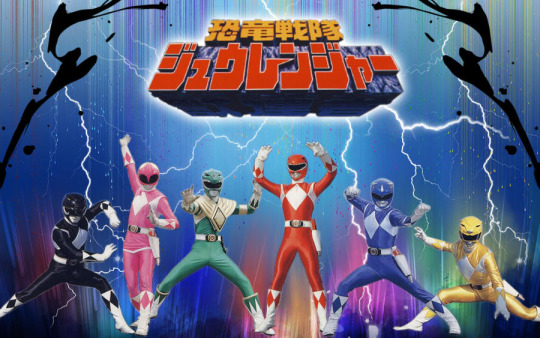
Frontier is well-known -- and by well-known, I mean the staff has literally admitted it -- to be based off of Toei’s tokusatsu series Super Sentai. But what is Super Sentai, anyway? If anything, most people in the West probably know it as the original basis for Power Rangers (and Power Rangers will probably be their only real understanding of non-kaiju tokusatsu). But that doesn’t really have a lot in common with Frontier, does it? Well, you might be surprised.
Let’s take a look at Super Sentai as it’s known in Japan, and its relationship to Frontier and Digimon as a whole!
Much thanks to @digitalgate02, @demonoflight, and my other tokusatsu consultants who assisted in the making of this post.
So what is Super Sentai anyway, and how is it different from Power Rangers?
youtube
I don’t want to assume what people reading this post know and don’t know beforehand, but I at least imagine readers of this blog are more likely to be familiar with Power Rangers. Power Rangers’ relationship to Super Sentai is that it’s the American adaptation of Sentai, but the word “adaptation” is a bit loose here. More specifically, it uses the suits, character designs, and battle footage from a given Sentai series, but exactly how closely it follows the premise of the original Sentai it’s “based” on will vary, and in many cases (including with the original Mighty Morphin’ Power Rangers), it won’t even remotely resemble the original premise at all.
Generally speaking, the main differences between Super Sentai and Power Rangers are:
While it’s not to say Power Rangers doesn’t have some degree of camp, Super Sentai takes the camp and marinates itself in it. Dramatic poses, over-the-top surrealist humor, explosions for no good reason, personal catchphrases, excessively noisy talking toys, and basically trying to be as outrageously silly as possible. In fact, Sentai series that don’t go hard enough on these factors often get criticized as “too bland”/“not fun enough”. A lot of these factors end up getting toned down in the transition to Power Rangers to give it more of a “cool” image (case in point, Power Rangers exists in the first place because Haim Saban thought Sentai was “weird”), and it’s to the point where certain Sentai series with “absurd” enough premises like ToQger and Kiramager are suspected to be impossible to market as Power Rangers because the Western market will consider them too cheesy.
Most Sentai characters are adults (canonically adults, not just adults acting as teenagers). This means they often have the degree of societal freedom adults have, and, on the flip side, it means the series can often be more active about putting its characters through harsher plot events, up to and including permanently killing them off. This doesn’t happen as much in modern Sentai series, but it did happen with enough frequency in the past that Power Rangers (which is significantly more shy about killing characters off) would run into problems because they would run out of footage for a character whose counterpart had died in the original Sentai.
While there are still plenty of Sentai series with normal humans on its teams, Sentai will generally be more willing to have more outlandish premises for its background characters, such as ancient warriors emerging from suspended animation, angels, alien pirates, furries people from a race of humanoid animals, actual robots, and more. It also means it can have a lot more variation in premise; for instance, Kyuranger takes place entirely in interplanetary travel, and doesn’t touch on Earth very much.
Individual Sentai rangers will have names specific to their series; for example, Zyuranger’s Red is named “TyrannoRanger”, while Gokaiger’s Red is “Gokai Red”. Modern series will also often give them longer one-sentence titles to use during their roll call; for example, “The Sparkling Inspiration, Kiramai Red”. (Frontier’s “this Digivice will purify you” lines are probably somewhat meant as a callback to these.) In line with Sentai being very deliberately campy, the roll call is almost always dramatic and drawn-out, with a group pose, sometimes even a group title, and occasionally an explosion.
While Power Rangers did eventually concede to following Sentai’s take on it to some degree, barring minor things like crossover movies and special series, every Sentai series has had its own distinct premise and a change of cast since the very beginning, in contrast to Power Rangers which tried to have multiple separate Sentai series be adapted into one single continuity for several years. (This caused infamous trouble when the ninja-themed series Kakuranger and the absurdist comedy Carranger had premises and tones that were extremely incompatible with the other series Power Rangers was working with at the time, leading to the Power Rangers works based on Kakuranger and Carranger being extremely controversial.)
While this happens more with Sentai’s sister series, Kamen Rider, Sentai is considered enough of a cultural touchstone in Japan that actors will often be booked for it as a stepping stone to get more exposure and eventually break into the industry. While it does have a bit of kids’ show stigma, it’s still a staple of Japanese pop culture (as is tokusatsu as a whole), and so it doesn’t have nearly as heavy of a “weird corny kids’ show stigma” that Power Rangers unfortunately still has.
More broadly, tokusatsu is a genre that’s just very well known and accepted in Japan in general. The definition of tokusatsu is any series that relies mostly on practical effects in live-action, including rubber and spandex suits, and beyond just Super Sentai and Kamen Rider, there’s competitor company Tsuburaya’s Ultraman, and kaiju (giant monster) franchises like Godzilla, and even tons of other Sentai- and Rider-like transforming hero shows that most people in the West have probably never heard of (GARO and Kikaider, anyone?). The advent of CGI has made tokusatsu come off as “cheesy” in the modern era, meaning most of it has been relegated to the kids’ show arena, but nevertheless, it’s a genre with a rich and long history. And, of course, because it’s focused more on being bright, absurdist, and fun, it often has a lot of the same absurd “cartoonishness” you’d get from animated series -- which means it actually has a lot of influence on animated kids’ shows, especially Toei shows, despite not actually being anime itself.
Sentai’s influence on Japanese kids’ shows, on Toei works, and on Digimon as a whole
Super Sentai has been running continuously, with virtually no significant breaks, since 1975. In that sense, it’s probably one of Toei’s most historically successful franchises ever (its sister series, Kamen Rider, is probably a bit more culturally prominent in the long run, but it also suffered a long break between its Showa and Heisei periods). Every single year comes with a new premise and a new Sentai team, meaning that a vague set of tropes common to most Sentai series is embedded harder in the public memory than any one specific Sentai series.
And, of course, Sentai is a Toei series. It’s by their live-action department instead of their animation department, but nevertheless, Sentai has shaped a lot of Toei’s kids show formats and style. Even Sailor Moon exists in the form it does now because of Sentai; it would have been an anime adaptation of Sailor V if it hadn’t been for discussions about making a Sentai-like team of magical girls (which means that, by proxy, it influenced every other “magical girl team” series that followed it). Moreover, Digimon shares a lot of staff with Sentai; most prominently, 02 head writer Maekawa Atsushi went on to be the head writer for the very well-acclaimed Mahou Sentai Magiranger, regular Adventure/02/Tamers episode writer Urasawa Yoshio was the head writer for Gekisou Sentai Carranger, and Xros Wars head writer Sanjou Riku was the head writer for Zyuden Sentai Kyoryuger (and this is even before we start getting into the shared individual episode screenwriters). In fact, 02 even referenced it for fun in episode 42 (note that “Sentai” is the Japanese word for “squadron”):
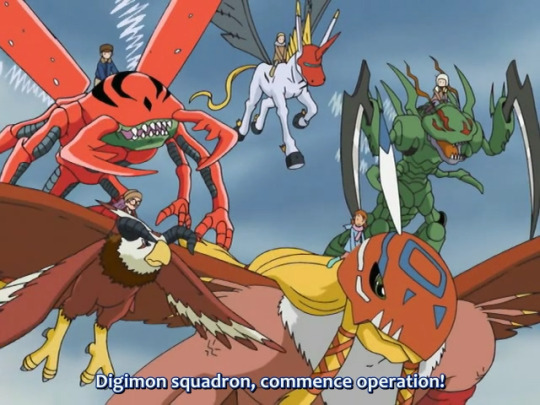
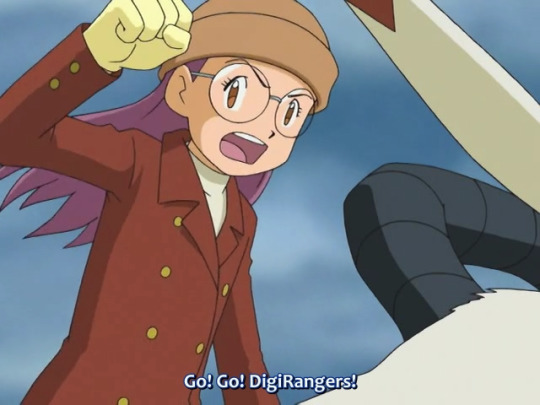
The reason these shows have so much in common is that Sentai’s precedent actually had a massive influence on Toei’s original children’s shows, including Digimon. In fact, a lot of what Western Digimon fans considered to be unique to Digimon, or difficult to get used to from a Western perspective, had been done by Sentai for years already:
Most significantly, the sheer concept of changing up the cast, premise, and tone every year had basically been standard form for Sentai (and of course, not just Sentai, but also other Japanese children’s shows from other companies, like Ultraman) for decades. The idea that the story you're watching will be wrapped up in a year was already a well-understood concept by that point, as well as the fact it allows a franchise to have more variety instead of beating a dead horse of a concept over and over. In fact, even the nomenclature of referring to different Sentai/Digimon/etc. series as “seasons” is a very American-tinted concept, because they’re not treated as seasons of the same show in Japan, but legally registered and acknowledged as distinct series that happen to be part of the same franchise (and considering the premise changes every year, it’s probably a more accurate way of describing it anyway).
The idea that the core group of protagonists will fundamentally be a team with each member on an equal level, and the idea that there would be specific “focus episodes” focusing on a given character or given relationship, is often thought by Western Digimon fans to be something that was codified by Adventure, but in actuality it’s been a staple of Sentai since long before then (and has also shown up in Toei’s other shows like PreCure). Debates about whether the Red’s been getting too much focus this year have characterized the Sentai fandom for ages.
Even certain tropes like “the red hot-blooded leader and the blue cool-headed rival” are heavily immersed in public memory thanks to Sentai.
The “sixth (not always sixth) ranger” -- the idea of having a solidifed near-equal group for most of the series, and then throwing a wrench in it halfway through with a new character who joins the group, often having turned from the antagonist side -- was of course made very popular by Sentai (and, of course, it being carried over into Power Rangers made it popular in the West as well).
Digimon’s way of using insert songs takes several cues from the way Sentai does it (and thanks to Sentai’s very luxurious budget, it has a ton of insert songs per series -- basically imagine 02 or Xros Wars level, except every year). In fact, most of the Xros Wars insert songs are sung by vocalists who usually sing for Sentai.
While Digimon and Sentai are, of course, still very different series in the end, you can see that a lot of the rough writing style consistent to many Toei series is based on the fact Sentai has had success with that kind of thing for decades.
Sentai and Frontier
Frontier is definitely the Digimon series with the most fundamentally derivative premise, being the only one to have human kids transform directly into Digimon (somewhat contrary to the base Digimon concept of having a human “raise” Digimon). It’s also infamously made Frontier a very hard sell for people who aren’t familiar with it, mainly because of concerns about the lack of partners, but one thing I notice is that the complaint “the idea of humans turning into Digimon is weird” comes up far more in the West than it does in Japan. This is just my personal speculation, but I think it’s because Japanese kids’ media is simply just no stranger to having human characters transform into inhuman heroes on the regular. Ultraman’s been running since 1966 and revolves around humans turning into giant silver aliens. The original Kamen Rider involved a modified cyborg, and in fact, many Sentai and Rider and other similar tokusatsu series treat the transformed form as not just humans in powerful suits, but a manifestation of them actually physically transforming into something. Of course, the West does still have things like that like the Hulk or Ben 10, but usually they come with a heaping of angst about the potential loss of humanity, whereas the idea of “yeah, that’s just part of the premise, roll with it and don’t worry about it” is a lot more common in Japanese works.
(Incidentally, there are actually some Sentai series where the team members will have their own “partners” similar to Digimon, usually in the form of cute robot mascots. Ironically, Power Rangers seems to dislike these, and they usually phase them out to be inanimate or feral in their adaptations, with Beast Morphers being a notable exception most likely due to how unavoidably prominent the Buddyroids were in Go-Busters’ plot. Power Rangers RPM infamously mocked the “big googly anime eyes” on the cars that originally came from Go-Onger’s versions being actual distinct characters.)
Frontier is a series from 2002, so it’s interesting in that the “Sentai” it took huge inspiration from is already very different from the “Sentai” we know now (more on this later). A lot of what Frontier takes cues from are tropes that were more common to the Showa era of Sentai, or the early 90′s works, and some of them were even on their way out by the time Frontier aired (but still well-known in the memory of the adult staff making the series).
There are at least two things that were more associated with Sentai back in 2002 than they are now:
While there are still Sentai teams with five or more members in total with only one being female, having two female members is generally considered more of the modern standard, but back when Frontier was being produced, there was outright pressure to not exceed one girl in a five-person group (for a series made for boys). This is actually the reason Adventure starts off with seven characters; they wanted more than one girl on the team, so in order to maintain a high ratio of boys to girls, they had to make a group as big as seven (no word on why this didn’t apply to 02). At the time, Sentai series with more than one girl on a five-person team were very rare -- this is something Power Rangers was a lot more diligent about from the very beginning -- but, ironically, right after Frontier finished airing, having two girls on a five-person team started becoming a Sentai staple. If Frontier had aired only a few years later, it’s possible there might have been another girl besides Izumi.
In one really unfortunate factor that hasn’t aged well at all, the idea of Junpei being the “fat character” is something that comes straight from early Sentai, where it would be a stereotypical trope where the yellow ranger would be a comedic fat character who loves eating (the archetype example being curry, coming from the very first series, Goranger). This was already on its way out by the time Frontier aired -- in fact, no Sentai series that aired after Frontier actually does this -- but for anyone who was an adult at the time Frontier aired, it was a well-known trope, and it’s why the Persona series also describes it in its Jetman parody. Despite some unfortunate things having been considered about Junpei’s weight back during development and during an interview in 2003, in a possible reflection of the times, Junpei’s finalized character arc in Frontier is already far more tasteful than the usual invocations of the trope (in that it treats him mostly like any other character and focuses more on his friendmaking abilities and practical intelligence), and the 2019 drama CD offhandedly mentions his weight without making a huge deal about it, so while your mileage may vary on how tastefully the final product came off as, it’s definitely far, far better than it really could have been given context.

The Sentai series that Frontier most obviously takes after is Kyoryu Sentai Zyuranger, which aired in 1992 (ten years before Frontier aired). Rather fortuitously, it also happens to be the series that was adapted into the original Mighty Morphin’ Power Rangers -- but in Japan, Zyuranger has some cultural significance besides just happening to be the first series that got localized off in the West.
For some context, Sentai was actually on the verge of dying the year before, resulting in Zyuranger’s predecessor, Jetman, adding a ton of soap opera tropes and saving the franchise by getting the support of a lot of soap opera lovers into it. (Jetman is the one Persona references for its “Featherman” Sentai parody.) Nevertheless, the fact remained that Sentai had been doing poorly because people were a bit tired of how repetitive it was getting. Prior to Zyuranger, every Sentai series had a bit of a “sci-fi enhanced secret agent” plot, and so Zyuranger decided to change things up by being the first Sentai series with a more fantasy-oriented plot, allowing for Sentai to more drastically reinvent itself thereafter. Thus, the Zyurangers are warriors from ancient tribes who went into suspended animation to be ready when threats resurfaced in the modern day. Hmm, that sounds a bit familiar, doesn’t it?
youtube
The biggest dead giveaway that Frontier mostly takes from Zyuranger, however, is the fact that series producer Seki outright stated that Kouichi’s position as an enemy-turned-ally sibling of a major character was a Sentai-inspired element. When you look for which Sentai had this, it turns out Kouichi’s character story is a blatant callback to Zyuranger’s Burai. DragonRanger, Burai, was the long-separated older brother of TyrannoRanger Geki, with Geki having been taken away by the Yamato Tribe's royal family right after he was born. Burai fostered jealousy for his younger brother and followed him in suspended animation to take revenge. After Geki learned that Burai was his brother, the two reconciled, but Burai learned that he was already dead and on limited time, and spends his last moments giving his powers to his brother before he dies...wait, wow, this is really familiar, isn't it?
(Fortunately, Kouichi survives, but Burai wasn’t nearly as lucky.)
Burai was Sentai’s first example of a “sixth ranger” in the form we currently know the trope as, and just like his counterpart Tommy Oliver over in Power Rangers, the character inspired immense popularity and led to tons of other media, Sentai or otherwise, making use of the trope. Of course, Adventure and 02 had already used it in the form of Hikari and Ken, but Kouichi is such a blatant callback to the original Burai himself that it isn’t even subtle.
Modern Sentai
At this point we’re at a bit of a digression, but as I said before, as of this writing, Super Sentai has been running continuously since 1975, and that includes after Frontier’s time and well into the modern era. This means Sentai itself has already changed a lot in both style and in public perception. As I mentioned earlier, a lot of what people know Sentai for now wasn’t as much of a thing back when Frontier aired twenty years ago, so Frontier was based on a version of Sentai that doesn’t quite exist in the same way it does now. So what is Sentai now? What’s changed, and what hasn’t?
youtube
youtube
Well, it’s still running. Several things have been modernized, and while there’s a lot more CGI than it used to be (which has been a serious concern for veteran fans as time has gone on), it’s fundamentally still a practical effects franchise. While the process has been slow, the gendered color stereotyping has been slowly chipped away at; on top of making two girls on a five-person team a more regular occurrence, female characters have been associated with non-pink colors like yellow, blue, silver, and most recently green, and the most recent series (as of this writing) currently has the coveted male pink ranger (finally!). In general, the association of “this character’s color must have this kind of personality” is slowly starting to erode, and while red is still almost always the leader, different variations of team dynamics that aren’t just things like “hot-blooded red, cool-headed blue, comical yellow” are starting to appear, or at least it’s possible to see a bigger variety of different takes on them.
In 2000 (when 02 was airing), Toei rebooted its old Kamen Rider series into what’s now known as “Heisei Kamen Rider”, and Rider and Sentai became sibling shows on TV Asahi known as the “Super Hero Time” block. In 2004, a year after Frontier ended, Toei started its PreCure magical girl series, which gained a reputation for having the girls physically beat up their opponents, and since the three shows aired (and still air) back-to-back on Sunday mornings, they started gaining a collective fanbase in which it was commonly understood that being a fan of one made you very likely to be a fan of the others. Among the three, Sentai is the one most likely to be closest to the monster-of-the-week format and is probably the most formulaic of all of them (probably due to its long history being based on such a formula), but since all three series change every year, the dynamic between them will change depending on the year. The three series will also often cross-promote each other (especially Sentai and Rider, since they’re both tokusatsu), and, in what might be a bit of a depressing thing to think about, the three of them probably collectively represent the kind of thing Digimon could have been if it didn’t have such a troubled history.
In 2011 (when Xros Wars was airing), Sentai’s 35th series, Gokaiger, was produced as an anniversary celebration that involved crossing over every single Sentai series to date, with at least one actor from every series making some kind of cameo. Despite the fact this sounds like an absolute disaster in theory, the result was very well-acclaimed thanks to the strong central premise of space pirates who can turn into any ranger form in the franchise and use their abilities to learn what heroism is (in fact, the space pirates are arguably more popular than the actual crossover elements). In 2021, probably wisely figuring that it wouldn’t be a good idea to imitate Gokaiger too closely because everyone would keep comparing it, 45th Sentai anniversary series Zenkaiger took a completely different comedic approach to its crossover elements, which also ended up being very popular.
Of course, since the series has run for so long, there’s already been multiple generational changes with kids who grew up with the series becoming actors in the series themselves, and the franchise has its own branch of direct-to-video special movies (think similar to OVAs) targeted at adults who watched the series as kids, such as “10 Years After” specials that bring the original actors back for a short sequel movie. Amusingly enough, Kouji and Kouichi’s voice actors Kamiya Hiroshi and Suzumura Kenichi are huge fans of tokusatsu (even besides occasionally being in it themselves) and jointly run an official radio show called Kamen Radiranger, where they talk about the currently airing Sentai and Rider and interview some of the actors and staff in it. Part of this involved sneaking into the Kyoryuger dance ending theme, which of course led to a fanartist making a Frontier parody.
Unfortunately, however, things haven’t been looking very good for Sentai lately. While the most recent few series (as of this writing) have been critically acclaimed in terms of actual storywriting, in kids’ shows, toy sales are everything, and they’ve been on a very noticeable slump since 2015, made even worse by the pandemic. As a result, Sentai has been getting a bit desperately experimental with most recent series Zenkaiger and Donbrothers, and there are some genuine concerns that the series may finally die soon after all of these years (although, in a bit of bitter irony, it’s still doing a lot better than Digimon despite that). Of course, it being such an iconic cultural property gives it a bit of insurance from having the plug pulled on it abruptly, but there are definitely concerns. Time will only tell how things work out, but there’s no doubt that even the modern incarnation of Sentai, despite it having changed greatly from what it used to be known as before, still has a lot of core elements regarding its approach to ensemble casts, team balance, character color coding, and hero writing that are very important to the kids’ shows surrounding it.
youtube
Besides, the opening for the currently running series totally slaps.
#digimon#digimon frontier#super sentai#shihameta#please consider this my repentance for not finishing frontier fest
100 notes
·
View notes
Text
For they know exactly what they do
Today there was a pretty long article published in the German newspaper FAZ, written by Julia Schaaf. Since there were quite a few interesting topics raised in it and Måneskin talked about some new aspects (or in more detail), I translated the whole thing (it might also have helped me to procrastinate).
Full interview in English under the cut.
For they know exactly what they do
June 22, 2021
Four young rock musicians from Rome are today's hottest band. Måneskin are enchanting Europe. Why? We met them for an interview.
Every romance needs its founding myth, an anecdote from the beginning, something you can tell later in more difficult times for self-assurance.
In the case of the band Måneskin, who first had Italy and now half of Europe wrapped around their fingers, and who are now trying to conquer the rest of the world with their rock music, there is the story of the shoe box. Rome, around five years ago: Four teenagers who are meeting every day after school in their rehearsal room to make music together, and sometimes they play their songs on the Via del Corso in the city centre in front of a changing audience. One day they want to record their own stuff. They find a studio that they can actually afford and as they go there they bring a shoe box, with the name of the band written on it, 'moonshine' in Danish, the bassist's mother is Danish. In the box: around seven kilogram of coins. The things you get from playing music on the streets. Everyone searching through Instagram for photos from that time can find four hippies with children's faces, three boys in batik, the girl is wearing a straw hat.
As they have to pay [for the recording], frontman Damiano David, 22, says that there was this guy, Angelo, and his bandmate Victoria De Angelis, 21, is interrupting: “No, Andrea, not Angelo”, and all of them have to laugh because a rigid studio manager with the Italian name 'angel' would be even funnier for a founding myth. David continues his story: “The guy was completely dumbfounded. 'We can't do that.' We went: 'Sure we can, that's worth the same even if it's just 20 cent coins, it's still 300 euros.” Thomas Raggi, 20, the guitarist of the band, is gasping for air as he laughs, while drummer Ethan Torchio, 20, is smiling dreamily. David finishes: “And then we snuck off before he was able to count it.” [the German text says 'verdrücken' here which is just a colloquial way of saying 'we left', but it entails some sort of a dramatic exit, so yeah, let your thoughts get creative how they left exactly :D].
Four young musicians on the verge of global fame are sitting on a white interview sofa in Berlin, completely styled, babbling across each other like overeager teenagers.
Ever since the Roman band first won the music festival Sanremo and then also the Eurovision Song Contest, carried by the enthusiasm of European viewers, you could say Måneskin has become a phenomenon. “Rock 'n' Roll never dies!”, Damiano David yelled fueled by the adrenaline of winning, and the insinuation that circulated on social media of the singer snorting during the counting of votes in front of a live camera – including their strict denial followed by a negative drug test result – might have given an additional boost to their public interest, their exploding album, ticket and merch sales, and their outstanding success on Spotify.
“We think it's a shit prejudice against rock music that there always have to be drugs involved. We fully threw ourselves into our participation with the utmost professionalism. We give everything for the music. So of course we don't want people to think that we can only do that because we take drugs.” – Victoria De Angelis
Prior to Eurovision, Måneskin was more of an insider's tip outside of Italy. Handmade rock music, not creating something entirely new but paying homage to the good old times with classic guitar riffs and cracking drum beats, being a lot of fun but also quite fragile and vulnerable at times and, first and foremost, conveying a captivating energy. Finally, on the stage of Rotterdam, live after so many months of isolation and renunciation, this wave of energy spilled straight over into European living rooms. It seemed easy to (mistakenly) interpret the winning song “Zitti e buoni” (Shut up and behave) as a declaration of frustration of our youth in times of a pandemic. In fact, singer Damiano David is singing about the favourite topic of the band: the unrelenting need to, against all odds, be yourself, despite or perhaps because you are different. The message fits their provocative sex appeal, which the band uses to demonstrate their independence of gender norms at any given time. But the core essence of rock music has always been the promise of unlimited freedom.
Thus at the first moment, the meeting with Måneskin is kind of startling. It's Wednesday, we are in the top floor of the new Sony head quarters in Berlin. The four Italians have just started their two-week long promotion tour through Europe. In the afternoon there will be a live concert in a queer club [the SchwuZ, but that's not mentioned here] in Neukölln, which will be streamed via TikTok. Around one million viewers will watch the show, some of them even from Brazil, so people at Sony are pretty excited [for Måneskin to come here]. But at first, these stunningly gorgeous creatures [yes, that's the exact wording :D] are standing surrounded by an entourage of people – their management, PR team, a stylist, a photographer, people who can hold a smartphone or a cigarette if needed [this paragraph is worded a little weirdly, especially taking into account that basically their whole team / 'entourage' is just friends of them, but it seems like the journalist didn't know that or maybe they just wanted to describe their first impression]. They seem like fictional / artificial characters out of a Hollywood movie. Transparent frill blouses with blazers and flared leather trousers, even the platform boots, everything brand-new, the makeup makes their faces look like a glossy magazine cover even in person. The smokey eyes of De Angelis and Raggi make them look smug and bored. Later, on the pictures it will probably look cool.
So of course your first impression might be: This band is under contract to industry giant Sony ever since their success on an Italian casting show [X Factor] in Winter 2017. The music industry must have its hand in the game when a band is photographed half-naked by Oliviero Toscani and styled by Etro. Also, one does not simply rent a villa with a pool in Rome to produce new music there, isolated from the rest of the world. And who else went to London for two whole months, shortly before the winter lockdown, just for inspiration? After the TikTok concert in Berlin – De Angelis and David are now wearing fishnet shirts that sparkle with every move, their bare nipples covered with an X of black tape – the band is posing with a few influencers. In the world of social media you would call that 'producing content'. But what does that mean for a band who are preaching their hosanna of authenticity? How authentic is Måneskin? And is their pointedly casual approach to sexuality and gender cliches in today's pop-cultural spirit more than a marketing strategy?
We're in the interview, the recording device is running for not even five minutes, when Victoria De Angelis says: “Actually, we just try to be ourselves and do what we really want to do.” And really: The more you listen to those four how they speak about the early days of the band in their slurred Roman dialect, about the shoe box and their own experiences with being different, but most importantly about their shared obsession [with music], the more you realise that [De Angelis] is very serious. Ethan Torchio, who got his first drum kit at the age of six or seven from his father because he was beating everything he could reach, says: “For me, music is like food. I cannot live without it.” The bassist next to him laughs at his pathos. Singer Damiano David applauds the otherwise more reserved friend for his truthfulness [it says 'klarer Punkt', meaning 'for the point he makes', but it makes it seem like Damiano is agreeing with Ethan here, although it doesn't indicate whether he agrees that yes, music is everything for Ethan or that he understands and feels the same].
De Angelis and guitarist Raggi already knew each other from middle school and they were the ones who tried to form a band at the age of only 13, a band that actually took music seriously.
De Angelis: “It's just difficult at that age to find other people who really put everything into music and who truly commit themselves and are willing to invest a lot of their time.”
Raggi: “We set strict rules and scheduled fixed times for the rehearsals, for every day.”
David: “Fever, stomach ache, there was no excuse. Even if you were feeling sick in the rehearsal room. At least you were in the rehearsal room.”
The way the four of them talk across each other, completing each other's sentences, taking turns in talking and sometimes joking about each other, seems intimate and playful. Singer David remembers how at first bassist [De Angelis] was merciless towards him when it came to her first metal band project, as she told him that he wasn't committed enough [to the music]: “Back then I was still playing Basketball. I was one of the people that Vic absolutely didn't want [in her band].” Drummer Torchio was later discovered through Facebook, even though there had already been a drummer, a close friend, but he was not good enough. It seems as if even back then music was everything for them. Even if it meant that only Raggi managed to graduate.
And why rock, why rock music of all things? Because it's great, the four of them say in unison. David adds: “Actually, it's a genre that allows you to do everything you want to do.”
When they played on the street, they were laughed at by their classmates. But not only there. De Angelis explains that she never wanted to be a typical girl: “I was always deterred by those stupid boxes that people put you in, and that are just restricting and constraining you, because something is only regarded as male or female. I always rejected that. Instead, I just wanted to do the things I enjoyed doing, I went skating and played football.” Torchio says: “Friends who are not friends anymore were already telling me at the age of ten that those“ – he grabs his long, silky black hair – “were wrong. Because I'm a boy and boys are meant to have short hair, long hair is only for girls. I was bullied a lot for that.”
“Compared to the past, people in our age became much more open-minded. It gets better.” – Thomas Raggi
Frontman David on the other hand, for whom eye shadow, jingling earrings and nail polish as well as his bare torso with the tattoos have become trademarks by now, says: “I was actually more of the average boy.” De Angelis convinced him to try out some eyeliner, which he describes as a spiritual awakening: “I liked myself much more [with makeup]. I saw myself more as myself. As if it had been a suppressed desire of mine.” On a trip to Copenhagen with the others, when he realised that it really didn't matter what people were thinking about him, he got his first fake fur [coat? the article doesn't specify that] in a second-hand shop and let his clothing style be guided by his own love to experiment: “I realised that my whole life I was just going at half speed.” When it comes to diversity all four of them are becoming almost missionary.
At the same time, their success is not only opening doors for them. Back home in Rome they are barely able to go out on the street due to all the paparazzi. “[You need a] hoodie and huge sunglasses”, David says, “the mask is quite helpful, too.” And still, none of them is complaining, and Torchio explains why: “Even if those experiences right now may have sides that are not so pleasant, we still know that for us a dream is coming true. We experience something that we always had in our minds, so we are willing to face every consequence that this entails.”
So is the band facing difficult times, is Måneskin going to change with all the success? Again, all of them answer at the same time.
David: “I'm not worried about that.”
Raggi: “No way!”
De Angelis: “On the contrary. Everything that happened to us happened because we are who we are, so we want to continue the exact same way and stay ourselves.”
Just a few hours later, they are at the stage in Neukölln, bouncing around like pinballs, hammering at their instruments, flirting with each other. “We are out of our minds, but different from the others”, David sings their winning hymn against conformism, and: “The people talk, unfortunately they talk.” Here on stage, the four paradise birds [a German word describing someone with a flamboyant personality] with their half-nude-glittering outfits are radiating an incredible energy with the utmost sincerity, and you begin to wish there was a live audience instead of the TikTok cameras, absorbing and spreading this energy. Måneskin. A cry for a life after the pandemic, a cry for freedom and a better world.
“We do what we wished for all our lives.” – Ethan Torchio
#måneskin#maneskin#måneskin interview#my stuff#i'm sorry if someone already translated it but i was working on this for the past 3 hours now so i'm still gonna share it#i know most of it is not very new but there were some quite interesting details in there#and it's just always great to read about those four dorks so i wanted to share it with all of you who wanted to read it but couldn't#enjoy and please ignore any possible mistakes i didn't have the time to proof-check everything
185 notes
·
View notes
Text
A Lesson In Romance #7: False Start
Spencer Reid x Fem!BAU!Reader
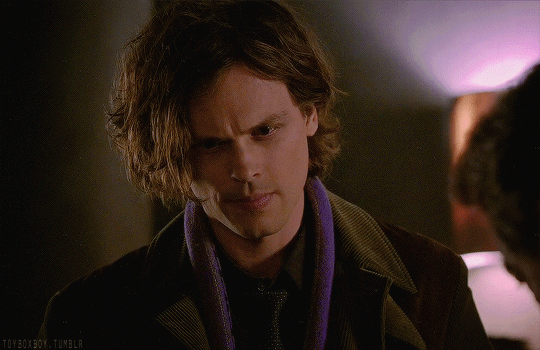
Genre: Fluff
Warnings: Just a lot of awkward vibes hahaha
Word Count: 1.7k
Plot: Reader keeps getting caught in rom-com situations with Spencer Reid. This time, they try to confess their feelings.
A/N: I didn’t actually manage to include the definition of a False Start in the chapter itself, so I’ll add it at the end. No spoilers for now!
Masterlist | All chapters here!
-----------
It took you 24 hours to decide that you were going to do something about your feelings for the good doctor. Pretty quick, considering you were a living, breathing rom-com cynic. But as ancient Greek philosopher, Heraclitus, once said: "The only constant in life is change".
Specifically, change happened after you woke up in your cute co-worker and dear friend's arms and you wanted nothing more than to get back into them as fast as possible.
But by the universal laws of working in the BAU, catching a break seemed to be the hardest when you actually wanted one.
Firstly, it was like every serial killer in the country decided to cancel their vacations simultaneously, swamping the team with urgent case after case. At this point, you were more familiar with the couch on the jet than your bed at home, and everyone was feeling the strain.
Secondly, if you weren't sleeping, you were usually out in the field chasing unsubs with Derek or Rossi. You had stopped holding out hope for being paired with Spencer — on account of your areas of specialty overlapping too much, and Hotch not being the type of leader to waste his resources — and as a result:
Thirdly, getting even ten minutes alone with the genius became an impossible task, and not for lack of trying either. At the start of the month, the two of you had tried to adapt your breakfast ritual to the road, but it always got interrupted mid-coffee order or even at the ding of the lift. Not that you and Spencer stopped trying, no, but your patience was wearing thin.
So you did something you hadn't done since you submitted your application to join the BAU — you prayed for a chance.
Because every day that you didn't admit your feelings to the doctor was another day fighting the compulsion to tell somebody else about them, and god only knows what a room full of profilers (and one nosy tech analyst) would do with that kind of information.
Then, out of the blue, the door of opportunity opened.
After two weeks of straight travel, the team had earned a well-deserved one night’s rest in your own beds before dealing with a local case, bright and early tomorrow morning. And since your flight landed at 2am and all the trains had stopped by then, this gave you the perfect shot to execute your plan.
Unfortunately, you forgot to take into account the most important factor — your nerves.
It didn't help that Derek had wolf-whistled in the carpark as the two of you walked off in the same direction, nor that Spencer immediately put your favourite album into the CD player out of instinct; an overly domestic action that made your heart beat even faster.
But it was when you arrived in front of his apartment building that you felt the worst of it. As you tried to summon the right words to your lips, your heart hammered in your chest and your thoughts jumbled themselves into nonsense.
"Are you ok?" Spencer asked, snapping you out of your anxious spiral instantly. "You don't look so well."
"I-I'm fine." Your fingers twitched nervously.
"Doesn't seem like it." He looked down at your hands, and you cursed your subconscious brain for giving you away. Then, he placed a hand over yours and your heart stopped.
"You're not alright, that's for sure, but it seems like it's just sleep deprivation." He assessed, bending slightly to look at your face. "You can't drive in this state. Do you want to come in?”
Your head snapped up to meet his gaze, ready to protest, but Spencer beat you to it. "Let’s go. You wanted to talk about something, right?" He called out, already one foot out of the car.
Before you could realise what was happening, you found yourself sitting on Spencer's couch holding a warm cup of tea.
This was the first time you were in his apartment. Yet, it was exactly what you thought it'd be like. Every wall was lined with bookshelves, filled to max capacity with books of every topic imaginable from neuroscience to philosophy. Those that didn't make it to the shelves were found in random stacks around his apartment, standing out against his forest green walls.
"Did you know that chamomile tea is a natural remedy for insomnia? In fact, it is commonly regarded as a mild tranquilizer. It's calming effects may be attributed to the antioxidant apigenin, which binds to specific receptors in your brain that initiate sleep and reduce anxiety." He explained, walking over with his own mug.
"I actually did know that." You smiled. The tea seemed to work its magic because you did feel relaxed, and you must have looked it too, because the worried frown disappeared off Spencer's face.
"Didn't know you were a tea person." You commented lightly, blowing the steam from your mug.
"There's a lot of things you don't know about me." He replied mysteriously, and you raised your eyebrows.
Spencer's apartment was too quiet, no rumbling fridge or quiet radio playing in the background to make your awkward silence any less pronounced. It was then that you noticed he didn't have a TV. Somehow this fact didn't surprise you very much.
"You... you wanted to talk to me about something?" He broke the silence, looking down at the hot tea swirling in his mug.
Right. You were here to talk about your feelings. Your face flushed as you tried to summon your willpower, again.
"I wanted to tell you something—" You began shakily. "But before that, I just want to preface, we can ignore this entire thing if you don't agree. I mean, I really enjoy our friendship as it is, and I wouldn't want to do anything to affect tha—"
"Wait." Spencer interrupted urgently, before catching himself. "Sorry, um, before that, can I say something?"
"Um, ok, shoot." You replied meekly, trying to hide your relief behind a long sip of tea. There was a pause as he gathered his thoughts, and you might have been seeing things, but he looked almost... nervous?
"The day we met, I calculated the probability of meeting somebody that shared my exact coffee order and the result was almost one in a million.” He finally spoke, lifting his head to meet your gaze. “That probability decreased when I factored in working together, sharing the same interests, and... and how I enjoyed spending time with you more than with anybody else."
Spencer cleared his throat, a blush coming onto his cheeks.
"Ever since then... my life just started making sense. I know I’m a scientist, not a poet, and I could tell you all the statistics about relationships in the world, but when it comes to you...”
His cheeks were crimson now, as he ran his fingers through his hair. You had a feeling yours looked the same.
"I guess, what I'm trying to say, is that I think you're beautiful and smart, and I have no idea what you see in me, but I'd really—"
Suddenly, both your phones buzzed violently against his coffee table, jolting you out of the moment. You leaned over in a trained motion, only to see exactly what you expected:
Garcia: No rest for the wicked, crime fighters. Conference room in 30.
Penny: No rest for the wicked, crime fighters. Conference room in 30.
You let out a sigh you didn't realise you were holding, and Spencer looked over at you, doe-eyed and nervous.
“The case?" He asked quietly.
There was a silence filled with words unsaid. "We should go." He said finally. "If we leave now, we can still make it on time."
You only nodded in response, more out of duty than desire, and gulped down the rest of your tea. The thought of what he was about to say burned down your throat.
Driving away from Spencer’s apartment was torturous. The doctor hadn’t said anything to you since he entered the car, only fiddling with his bag as he looked out the window. It was too dark to read his expression, but you wondered if he could still hear the way he called you “beautiful”, or whether the moment had already dissolved into the space between you.
Luckily, you didn’t need to wait long for an answer, as Spencer tugged on your sleeve before you exited the carpark, his face scrunched in worry.
"I really didn't mean for that to be so... weird. Can we talk about this again after the case?" He asked softly, and despite every semblance of logic left in your brain, you couldn’t stop the hope from blooming in your chest and you smiled.
That was when Spencer did something completely uncharacteristic. (You didn't know this at the time, but it was something that you would tease him about for a long time after.)
In one fluid movement, the doctor pulled you into a tight hug that elicited a squeak from you, but it only took a second for the initial shock to wear off before you relaxed completely into his warm touch. He took that as a sign to continue, burying his head into your shoulder and letting out a content sigh.
Unlike waking up to your bodies intertwined, nothing about this was a mistake. Not the way his fingers stroked your back peacefully, nor the way his curly hair tickled your cheek. You felt the stress of the past two weeks melt away in his embrace, and so did any coherent thought, except one: normal friends didn't hug each other like this.
Later when the two of you finally entered the conference room, miraculously still on time, nobody commented on the smiles plastered on your faces but everybody could tell. They were profilers after all.
But for the first time in awhile, you were just too happy to care.
-----------
Tag List:
@blue-space-porgs @nobutalsoyes @lady-loves-a-lot @queen-flower @oops-all-ajs @spottedzebrasinpartyhats @agentcarterisgay @totalmess191 @sapphic-prentiss @mellowalieneggsknight || @averyhotchner @amesandpineapples @willowrose99
Definition of a False Start here
#mads fics#spencer reid x reader: a lesson in romance#if you read this earlier and some things changed#that’s because I rewrote it lol#but that’s it I promise!!#spencer reid x reader#spencer reid x y/n#spencer reid#dr spencer reid#spencer reid fic#criminal minds fic#criminal minds fanfic#cm fic#cm fanfic#bau#aaron hotchner#hotch#derek morgan#emily prentiss#david rossi#jennifer jareau#penelope garcia#criminal minds#spencer reid fluff#spencer reid x reader fluff#spencer reid x y/n fluff
185 notes
·
View notes
Photo
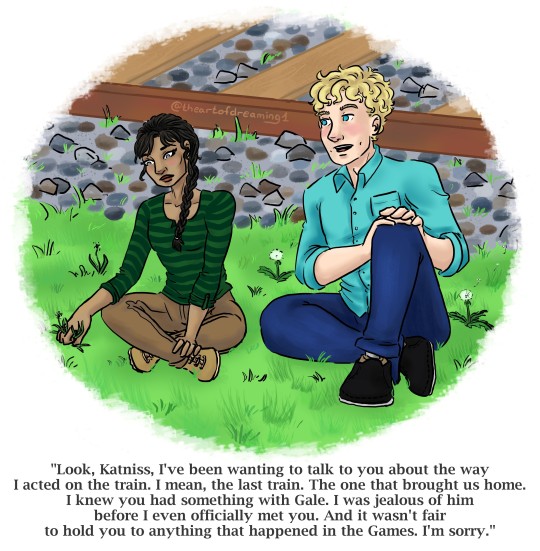
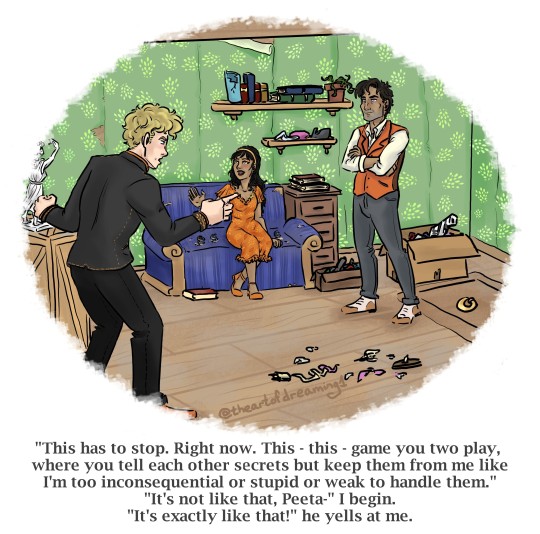
Katniss, Peeta, and Haymitch are slowly becoming a proper team! No more secrets! (for the most part)
As usual, my thoughts regarding this week’s prompts and (many) random thoughts on chapters 4-6 are below the cut.
heart
Losing that comfort of sleeping in each other’s arms after the Victory Tour must have been hard for Katniss and Peeta! Up until Katniss hurts her ankle, they probably didn’t really do much about it, just trying to make it through on their own... After she hurt her ankle and Peeta’s spending more time over at her place, I can easily imagine him staying over, at least until she’s fallen asleep, which might help a little... Since they are living only three houses apart from each other, I like to imagine that they can see each other’s bedroom windows from their bedroom (how else would Katniss know that Peeta sleeps with the windows open? I can’t really imagine that they would be able to open the windows of the train they were on - y’know, for “safety reasons” (i.e. making sure nobody can escape)); maybe they’d both light a candle and put it by their window, as a signal they are going to sleep... It’s not the same, but it helps a little
mind
I mean, aside from the systemic rigging of the reaping system (i.e. poorer people generally having more entries, so they can have some food), I can easily imagine there being a manipulation of the “odds” when someone becomes too vocal or troublesome for the local authorities, such as someone trying to unionize a district’s workforce, for example
soul
In the districts, their impact has to be big - their win alone was a huge defiance of the Games as they used to be... sticking together and sticking up for each other ultimately led to them defeating the Capitol’s rules! In-between the Games and the Victory Tour I don’t think there was much noteworthy going on (although maybe the fact that, so far, none of the new victors’ loved ones had been hurt - Prim, Mrs. E., but also Gale and his family would be visible during the celebrations, I’m sure, same probably goes for the Mellark’s - might tell the people in the district that Snow and his cronies were aware of the attention any assassination attempt would gather and that this, in turn, might actually could become the last straw that would spark a revolution. In a way, that was proof that the people on top were at least a little afraid of what the people in the districts would do...) And then, especially during the visit of D11, with Katniss expressing her thanks and Peeta reaching out to share their winnings with the people from D11, another district than their own - it must have provided a lot of inspiration, I’m sure.
As for the Capitolites, maybe some of them would notice for once how unhappy/riled up the people in some of the districts were... or at least stop to think about how this time, a show of love and companionship actually provided more “entertainment” and intrigue than the brutal gore and bloodshed from previous Games (also, longer lasting - there is actually much more “story” to be had from the star-crossed lovers from D12 than from any individual winner of previous Games, if you think about it... Their “love story” is still on-going, with an upcoming wedding and the promise of a family... it’s still creepy and voyeuristic as hell, though)
Chapter 4
Everything he [Haymitch] said was true about the Capitol’s expectations, my future with Peeta, even his last comment. Of course, I could do a lot worse than Peeta. That isn’t really the point, though, is it? One of the few freedoms we have in District 12 is the right to marry who we want or not marry at all. And now even that has been taken away from me. - God, this sucks so much! As Katniss rightly points out, her misery isn’t about Peeta at all - it’s about her (and also his, just pointing that out) agency being taken away! She’s being stripped even of that little sliver of agency that inhabitants of D12 usually have (choice of whom to marry, or whether to marry at all)
I wonder if President Snow will insist we have children. - Eugh, just the idea of Snow being the one to have the last word on that subject... 🤢 The invasion of privacy here... - The only person who should get to decide whether Katniss should have children or not is Katniss herself! Period!
My mind searches frantically for a way out. I can’t let President Snow condemn me to this. Even if it means taking my own life. Before that, though, I’d try to run away. - Boy, Katniss is even contemplating taking her own life, rather than to submit to the life the Capitol wants to force on her; it’s not her first choice (she’d rather run away), but it shows the desperation she’s feeling
Could I even manage to take everyone I love with me, start a new life deep in the wild? Highly unlikely but not impossible. - Later we will see that Peeta and Haymitch also belong into the category of “people Katniss loves” 😊(as well as her family, Gale, and his fam, of course)
“And Peeta’s team is probably still asleep.” “Doesn’t he need prepping?” I ask. “Not the way you do,” Effie replies. What does this mean? It means I get to spend the morning having the hair ripped off my body while Peeta sleeps in. I hadn’t thought about it much, but in the arena at least some of the boys got to keep their body hair whereas none of the girls did. - Gotta love that everlasting sexism that, even far into the future, still won’t allow women to have frickin’ body hair (y’know, like most humans do 🙄)
I can remember Peeta’s now, as I bathed him by the stream. Very blond in the sunlight, once the mud and blood had been washed away. Only his face remained completely smooth. Not one of the boys grew a beard, and many were old enough to. I wonder what they did to them. - Katniss seems to have committed every single detail about Peeta to her memory, including how his body hair looked when she cleaned him in the last Games... okay 👀😏 On a more somber note, what is it that the Capitol is doing to these poor kids?! The boys couldn’t grow beards and - I’m assuming - the girls wouldn’t get their periods while in the arena (since the Games can last for weeks, it would be a huge disadvantage if any of the girls also had to content with cramps + periods - aside from worrying about getting murdered, I mean); it’s such a violation of one’s autonomy over one’s own body, yikes
Flavius tilts up my chin and sighs. “It’s a shame Cinna said no alterations on you.” “Yes, we could really make you something special,” says Octavia. “When she’s older,” says Venia almost grimly. “Then he’ll have to let us.” - Eeek, no thanks!😦 And frankly, it really shouldn’t be Cinna’s call to make but, y’know, Katniss’s!!! I don’t know, I get real panick-y just reading this exchange (I have never even gotten my ears pierced - my mom wouldn’t let them be pierced until I could make my own decision on that subject matter and as someone with skin issues and bad experiences with needles, I really don’t feel the need to have any unnecessary metal inserted into my body, so... I’m good)
His [Peeta’s] apology takes me by surprise. It’s true that Peeta froze me out after I confessed that my love for him during the Game was something of an act. But I don’t hold it against him. [...] “I’m sorry, too,” I say. [...] “There’s nothing for you to be sorry about. You were keeping us alive.” - That apology of Peeta’s... *chef’s kiss*; it was totally understandable that Peeta was upset and needed some time apart from Katniss after her confession, which had caught him completely by surprise, not even Katniss blames him for that... But his apology shows that he really made use of their time apart to work out his emotions and to reflect on both their situations - that’s some emotional maturity to be envious of! Plus, his apology is a good move to get their communication channel opened up again
It would be nice if he’d come to me with this earlier, before I knew that President Snow had other plans and just being friends was not an option for us anymore. But either way, I’m glad we’re speaking again. - Come on, Katniss, cut this boy some slack! He can’t read minds - how is he supposed to know about these things if you don’t tell him anything? It’s nice that you’re glad that you guys are on speaking terms again, but communication isn’t a one-way street, y’know?
I remember the tiger lily cookie and, now that Peeta is talking to me again, it’s all I can do not to recount the whole story about President Snow. But I know Haymitch wouldn’t want me to. I’d better stick to small talk. - Katniss really should have listened to her instincts here - Haymitch might have a better idea of how the Games/Capitol works, but he knows little about teamwork, which is an important factor in their specific (and unprecedented!) situation; I’m not blaming Katniss for relying on her mentor here, but this entire approach is going to crash and burn in the next chapter
It’s good to feel his fingers entwined with mine again, not for show but in actual friendship. We walk back to the train hand in hand. - Not to say that you can’t have friendships where you frequently hold hands - you totally can - but it is noteworthy that I don’t think I can recall Katniss holding hands with any of her other friends... (somehow, I can’t really picture Katniss holding hands with Gale casually like that... nor with Madge or Finnick later on)
At the door, I remember, “I’ve got to apologize to Effie first.” “Don’t be afraid to lay it on thick,” Peeta tells me.- There is something about this exchange that speaks to me... maybe because it reads like some sort of an inside joke between them? Or because it shows that, despite being on good terms with Effie, Peeta’s totally aware of how high-maintenance/over the top Effie is... I dunno ¯\_(ツ)_/¯
Peeta has painted the Games. Some you wouldn’t get right away, if you hadn’t been with him in the arena yourself. Water dripping through the cracks in our cave. The dry pond bed. [...] Others any viewer would recognize. The golden horn called the Cornucopia. [...] And me. I am everywhere. [...] “What do you think?” he asks. “I hate them,” I say. I can almost smell the blood, the dirt, the unnatural breath of the mutt. - These are the pieces Peeta meant to exhibit in the Capitol, right? I wonder if he hoped that these paintings of his impressions/memories of the Games might actually connect with some Capitolites and might even move them to feel some empathy for the Tributes? Maybe he hoped that they would be more receptive for that kind of thing if he packaged it in art?
“All I do is go around trying to forget the arena and you’ve brought it back to life. How do you remember these things so exactly?” “I see them every night,” he says. [...] “Me too. Does it help? To paint them out?” “I don’t know. I think I’m a little less afraid of going to sleep at night, or I tell myself I am,” he says. “But they haven’t gone anywhere.” - I do wonder, whether and how painting out these moments could have therapeutic value for Peeta - on the one hand, the act of painting out specific intrusions/flashbacks might be helpful because he’d end up focusing on the more technical side of painting, y’know? Focussing on mixing the right shade of a certain color might help create some emotional distance from the moment itself... also, since painting usually takes some time, Peeta would actually spend a considerable amount of time facing these moments head on, rather than trying to avoid them (avoidance tends to increase the frequency of flashback/intrusions) and maybe spending so much time on them could also help him contextualize them within the broader narrative of his life, which is the basic principle behind Narrative Exposure Therapy, which is said to be pretty effective at treating PTSD... just my two cents
I can’t believe the size of District 11. “How many people do you think live here?” Peeta asks. I shake my head. In school they refer to it as a large district, that’s all. No actual figures on the population. - Perfect example of how tightly the Capitol controls the information the people in the districts have about the other districts... which is basically nothing. Let’s keep them in the dark so they are less likely to connect with each other and band together...
Cinna comes in with a pretty orange frock patterned with autumn leaves. I think how much Peeta will like the color. - Lol, Katniss bringing everything back to Peeta because she definitely hasn’t a crush on the guy, I see 😉
And then he [Peeta] hesitates before adding something that wasn’t written on the card. Maybe because he thought Effie might make him remove it. “It can in no way replace your losses, but as a token of our thanks we’d like for each of the tributes’ families from District Eleven to receive one month of our winnings every year for the duration of our lives.” - Peeta, the rebel! Talk about an act of radical kindness! I’m so proud of him. But also, I think this is another excellent example of how he and Katniss are on the same wavelength (this took me some time to find, but here you go): I silently say good-bye to Thresh and thank him for my life. I promise to remember him and, if I can, do something to help his family and Rue’s, if I win. (Ch. 23, THG)
I look at Peeta and he gives me a sad smile. I hear Haymitch’s voice. “You could do a lot worse.” At this moment, it’s impossible to imagine how I could do any better. The gift... it is perfect. So when I rise up on tiptoe to kiss him, it doesn’t seem forced at all. - Peeta: does anything that exemplifies his sense of morality; Katniss: *swoons* - but honestly, it is so beautiful how Katniss is so attracted to Peeta’s goodness and kind heart - it also tells us a lot about her (she is quite pure, as Peeta will point out later in this book) and what she values
“Wait, please.” I don’t know how to start, but once I do, the words rush from my lips as if they’ve been forming in the back of my mind for a long time. - And then Katniss launches into one of her spontaneous, heart-felt, and inspiring speeches/acts, expressing her thanks, sympathy, and a sense of kinship with people beyond the borders of her district, beyond the superficial barriers the Capitol has been trying to maintain in order to weaken the ‘common folk‘ and keep the exploitation going
The full impact of what I’ve done hits me. It was not intentional - I only meant to express my thanks - but I have elicited something dangerous. An act of dissent from the people of District 11. - Again, Katniss has done something that will solidify her as a symbol of the revolution without intending to do so and that’s the point, I think - she inspires people through her genuine displays of caring for others (which, in Panem, is already rebellious on its own)
Chapter 5
“We’re going!” says Peeta, shoving the Peacekeeper who’s pressing on me. “We get it, all right? Come on, Katniss.” His arm encircles me and guides me back into the Justice Building. - Protective Peeta! Also, I think it’s interesting to note the wording of Peeta’s arms “encircling” Katniss and then “guiding” her - his arms surround her, and he’s leading her away from harm (at least to the extent that is in his power - can’t really be safe from harm in Panem, can you?), but it doesn’t seem smothering or oppressive to Katniss in any way -”guide” has more of a connotation of giving direction without force, imo; in contrast, when Katniss talked about her kiss with Gale she mentions she’d never imagined how those hands [...] could as easily entrap me. (Ch. 2, CF); granted, these are two very different situations - the phrasing just stood out to me
“What happened?” Effie hurries over. “We lost the feed just after Katniss’s beautiful speech, and then Haymitch said he thought he heard gun fire, and I said it was ridiculous, but who knows? There are lunatics everywhere!” - Very telling how a clueless Capitolite like Effie wouldn’t register the rebellious aspect of Katniss’s speech; by keeping the Capitolites in the depths of sweet, sweet ignorance while simultaneously harshly trying to curb any spark of rebellion by cutting off the feed, the government is actually drawing the attention of the ignorant Capitolites to the act of rebellion itself (and also letting the people in the districts know that there was something censor-worthy going on); kind of shooting themselves in the foot here
As far as I know, Haymitch has only been here once, when he was on his Victory Tour decades ago. But he must have a remarkable memory or reliable instincts, because he leads us up through a maze of twisting staricases and increasingly narrow halls. [...] Eventually we climb a ladder to a trapdoor. When Haymitch pushes it aside, we find ourselves in the dome of the Justice Building. - I wonder how Haymitch has come to know this part of the Justice Building? Has he been to District 11 more often than Katniss supposes (he is friends with Chaff, after all), did his mentor take him there for some private conversation, or was there a moment during Haymitch’s Victory Tour where he felt so overwhelmed by feelings of guilt and powerlessness that he fled to the most desolate, solitary place he could find?
“I was supposed to fix things on this tour. [...] Calm things down. But obviously, all I’ve done today is get three people killed, and now everyone in the square will be punished.” I feel so sick that I have to sit down on a couch, despite the exposed springs and stuffing. - Obviously, all of this is awful and no one - especially a traumatized, 16-year old girl - should have to suffer carrying such a burden... But also, here we see one of the downsides of Katniss taking sole responsibility for everything - she totally forgot that Peeta might feel responsible too, only that he didn’t even know what’s at stake - which leads us to-
“Then I made things worse, too. By giving the money,” says Peeta. Suddenly he strikes out at a lamp that sits precariously on a crate and knocks it across the room, where it shatters against the floor. “This has to stop. Right now. This - this - game you two play, where you tell each other secrets but keep them from me like I’m too inconsequential or stupid or weak to handle them.”"It's not like that, Peeta-" I begin. "It's exactly like that!" he yells at me. - When kind, gentle Peeta’s mad, you know shit has hit the fan 😳 But also, being passed over/kept out of the loop seems to hit pretty close to home for Peeta (while I would like to know what his home life looked like before the Games, I have to admit that at this point, I’m somewhat afraid I might not be able to handle the truth...). I just think this scene is an important moment that leads to an end of (most of) their detrimental secrecy (hello end-of-CF-Haymitch!) and establishes their little team as such (hence the drawing)
“You’re always so reliably good, Peeta,” says Haymitch. “So smart about how you present yourself before the cameras. I didn’t want to disrupt that.” “Well, you overestimated me. Because I really screwed up today.” - Remember the last time someone overestimated Peeta (Foxface and the berries)? That ended in someone’s death as well... And, Haymitch? ‘Never assume’ applies to you, too!
“Do you think I gave them [Rue’s and Thresh’s families] a bright future? Because I think they’ll be lucky if they survive the day!” Peeta sends something else flying, a statue. I’ve never seen him like this. - Considering that his rebellious act of kindness is now threatening to become a sword of Damocles, hanging over those towards which he wanted to extend his kindness - simply because he’s been kept out of the loop (again)- Peeta’s anger is quite understandable
“Look, boy-” Haymitch begins. “Don’t bother, Haymitch. I know you had to choose one of us. And I’d have wanted it to be her. But this is something different. People are dead out there. More will follow unless we’re very good.” - Peeta doesn’t really care if it’s just his life on the line, but if other people’s lives are at risk? He takes no shit (it’s admirable in one way and deeply concerning in another); also, Peeta is right - while there still is a game to play, it’s not the Games, so different circumstances and rules apply
“From now on, you’ll be fully informed,” Haymitch promises. “I better be,” says Peeta. - Peeta generally is a very cooperative fellow, but don’t ever think he can’t be forceful and stand his ground when it matters!
“Did you choose me, Haymitch?” I ask. “Yeah,” he says. “Why? You like him better,” I say. “That’s true. But remember, until they changed the rules, I could only hope to get one of you out of there alive,” he says. “I thought since he was determined to protect you, well, between the three of us, we might be able to bring you home.” “Oh,” is all I can think to say. - This is such a quiet, sweet moment and also shows that Katniss, Haymitch and Peeta have been some sort of team from the start (also, in their team effort they actually managed to get the both of them back home!)
Everything is happening too fast for me to process it. The warning, the shootings, the recognition that I may have set something of great consequence in motion. The whole thing is so improbable. And it would be one thing if I had planned to stir things up, but given the circumstances... how on earth did I cause so much trouble? - Lol, you’re giving yourself a little too much credit here, Katniss ;) Frankly, the Capitol has been the one to create this powder-keg they are sitting on in the first place - all it needed was a little spark... All these injustices, the humilitation, the pain inflicted... it’s like an elastic rubber band that’s been stretched and stretched - until it snaps
“I’m something of an expert in architectural design, you know?” “Oh yes, I’ve heard that,” says Portia before the pause gets too long. - Bless Portia’s heart, making sure they avoid that awkward silence 😂
Effie looks so distressed that I spontaneously give her a hug. “That’s awful, Effie. Maybe we shouldn’t go to the dinner at all. At least until they’ve apologized.” - Aww, Katniss doing something nice for Effie!😊
Peeta and I join hands. “Haymitch says I was wrong to yell at you. You were only operating under his instructions,” says Peeta. “And it isn’t as if I haven’t kept things from you in the past.” - Peeta sorta apologizing, even acknowledging that he also had kept secrets from Katniss? We love to see it👍 - [...] “I think I broke a few things myself after that interview.” “Just an urn,” he says. - Peetaaa... stop diminishing your own physical injuries! Good thing that Katniss won’t let him: - “And your hands. There’s no point to it anymore though, is there? Not being straight with each other?” I say. “No point,” says Peeta. - Gasp! Honest, open communication as a good basis for a successful relationship? It’s more likely than you think!
“Was that really the only time you kissed Gale?” I’m so startled I answer. “Yes.” With all that has happened today, has that question actually been preying on him? - Peeta, you sly dog! Your priorities 😂
Some crowds have the weary-cattle feel that I know District 12 usually projects at the victors’ ceremonies. But in others - particularly 8, 4, and 3 - there is genuine elation in the faces of the people at the sight of us, and under the elation, fury. - I do think that it’s interesting how D4 is one of the districts being elated to see Peeta + Katniss and displaying such fury, despite being a Career district; just goes to show that, just because their odds are better at winning the Games, doesn’t have to make them more simpatico with the Capitol’s cruelty... (Considering how Finnick knows how to perform CPR, it’s highly likely that people in D4 are also used to awful and precarious working + living situations... maybe that’s exactly why they generally are so robust and do well in the Games; and maybe they are simply not that above joining the other Careers as long as it improves their chances of survival, like Katniss or Thresh had been... worked for a while for Peeta, too)
Effie starts giving me pills to sleep, but they don’t work. [...] Peeta, who spends much of the night roaming the train, hears me screaming as I struggle to break out of the haze of drugs that merely prolong the horrible dreams. He manages to wake me and calm me down. Then he climbs into bed to hold me until I fall back to sleep. After that, I refuse the pills. But every night I let him into my bed. We manage the darkness as we did in the arena, wrapped in each other’s arms. - 😭 Also: Very telling how Capitolite Effie just throws pills at the problem (with the best of intentions, I’m sure), which is an immediate, unpersonal, and superficial solution at best, whereas Peeta holding Katniss, offering comfort, understanding, a sense of safety, and human connection is so much more personal, intimate, and effective (for both of them!)
I personally killed the girl, Glimmer, and the boy from District 1. As I try to avoid looking at his family, I learn that his name was Marvel. How did I never know that? - You know why, Katniss - I suppose that before the Games I didn’t pay attention and afterward I didn’t want to know. - Still, not knowing his name didn’t stop you from humanizing him, Katniss, and that’s important, too
Whatever we do seems too little, too late. Back in our old quarters in the Training Center, I’m the one who suggests the public marriage proposal. Peeta agrees to do it but then disappears to his room for a long time. Haymitch tells me to leave him alone. “I thought he wanted it, anyway,” I say. “Not like this,” Haymitch says. “He wanted it to be real.” - Come on, Katniss, don’t be so callous; Peeta’s just as much of a prisoner here as you! Also, it’s all about being real or not real with these two, isn’t it?
Chapter 6
... you would think that at this moment, I would be in utter despair. Here’s what’s strange. The main thing I feel is a sense of relief. That I can give up this game. [...] That if desperate times call for desperate measures, then I am free to act as desperately as I wish. - Honestly, I think it was pretty short-sighted of Snow to let Katniss know so clearly that she didn’t succeed in her task; she did her utmost and it wasn’t enough - might as well fling caution to the wind now. All bets are off. If there had been still some small chance she could have ‘made things right’, she probably would have been trying harder to comply to his expectations. (I’m sure Snow thought the upcoming implementations of his stricter regime would be enough to keep Katniss in check, but pride comes before a fall ¯\_(ツ)_/¯)
It’s essential to get back to District 12, because the main part of any plan will include my mother and sister, Gale and his family. And Peeta, If I can get him to come with us. I add Haymitch to the list. - For such a ‘loner’, Katniss sure has a lot of people that are important to her... And how ironic that Peeta, who she isn’t sure she’ll be able to convince in following her will be a much more willing participant that Gale, who Katniss is pretty much banking on joining her
“You’ll probably have to pass a new law,” I say with a giggle. “If that’s what it takes,” says the president with conspiratorial good humor. Oh the fun we two have together. - The dynamic between Snow and Katniss is so strange; despite the obvious antagonism there is definitely some vibe of interacting with each other at eye level and it’s weird (Sidenote: Is there any law in Panem preventing minors from marrying?)
“I want to taste everything in the room, “ I tell Peeta. [...] “Then you’d better pace yourself,” he says. “Okay, not more than one bite of each dish,” I say. My resolve is almost immediately broken at the first table, which has twenty or so soups - couldn’t have happened to me; I hate soup (like, thick soups I maaaybe can get behind, but clear soup/broth is just flavored water to me, no thanks - then again, I’m a picky eater)
Peeta and I make no effort to find company but are constantly sought out. We are what no one wants to miss at the party. I act delighted, but I have zero interest in these Capitol people. They are only distractions from the food. - Well isn’t that a mood for every social gathering ever (one person I enjoy talking to and lots of food I like? Perfect.)
I pick up a small roasted bird, bite into it, and my tongue floods with orange sauce. Delicious. But I make Peeta eat the remainder because I want to keep tasting things - Katniss seems to like the combination of meat and fruit, huh? (the lamb and plums, now bird and orange sauce) Personally, it’s a combination that’s on thin ice for me; there are only a few dishes with that component I actually like and it took me forever to tolerate them (I don’t know if it’s the texture or the taste, but something makes me apprehensive about it); anyway, Katniss making Peeta eat the rest is such a casual, couple-y thing to do (or at least something you do with someone you feel very comfortable with, I think)
Peeta looks at the glass again and puts it together. “You mean this will make me puke?” My prep team laughs hysterically. “Of course, so you can keep eating,” says Octavia. “I’ve been in there twice already. Everyone does it, or else how would you have any fun at a feast?” I’m speechless, staring at the pretty little glasses and all they imply. - Oh boy, I have a lot of thoughts on this part: A) I just noticed how this is the second delicate/fancy glass/drink that’s bringing about a jarring revelation: first that orange juice with the frilly straw in THG, now these tiny wine-stemmed glasses, B) “Everyone does it” + “how else would you have fun?” are the shittiest reasons I’ve ever heard at a party for doing something stupid you probably don’t want to do (I’m having flashbacks to all the times I had people trying to pressure me into drinking alcohol as a teen - it was even legal, btw - although I insisted that I didn’t like the taste (which I still don’t, to this day); it was tiresome 😑), C) “everyone does it” - the people in the Capitol must have some messed up teeth if that’s a regular occurence (sure, they probably bleach their teeth all the time, but also... they’d really need to, D) the obvious: how effed up that they just puke to stuff in more food when in the districts people literally are dying from starvation?! (and yeah, unequal distribution of resources sadly isn’t just a thing in Panem, I know... but there is something about actively purging yourself just for funsies that’s just extra, well, sick)
All I can think of is the emaciated bodies of the children on our kitchen table as my mother prescribes what the parents cannot give. More food. - God, how awful! How powerless they must feel 😟
And here in the Capitol they’re vomiting for the pleasure of filling their bellies again and again. Not from some illness of body or mind, not from spoiled food. - Ooh, I’ve never noticed before how this passage not only recognizes physical reasons for purging, but also mental reasons! Wouldn’t have necessarily expected Katniss to acknowledge eating disorders like that, tbh... She has become a lot more cognizant and sensitive when mental health issues are concerned
One day when I dropped by to give Hazelle the game, Vick was home sick with a bad cough [...] he still spent about fifteen minutes talking about how they’d opened a can of corn syrup from Parcel Day and each had a spoonful on bread and were going to maybe have more later in the week. How Hazelle had said he could have a bit in a cup of tea to soothe his cough, but he wouldln’t feel right unless the others had some, too. - Aww, Vick is such a sweetheart! Hazelle is raising her kids right!
“Peeta, they bring us here to fight to the death for their entertainment,”I say. “Really, this is nothing by comparison.” “I know. I know that. It’s just sometimes I can’t stand it anymore. To the point where... I’m not sure what I’ll do.” He pauses, then whispers, “Maybe we were wrong, Katniss.” “About what?” I ask. “About trying to subdue things in the districts,” he says. - Peeta’s rebellious nature coming through again!
“Sorry,” he says. He should be. This is no place to be voicing such thoughts. “Save it for home,” I tell him. - I know Katniss means D12, but her phrasing of “home” evokes a more domestic, couple-y connotation again 😊
I don’t want to dance with Plutarch Heavensbee. I don’t want to feel his hands, one resting against mine, one on my hip. I’m not used to being touched, except by Peeta or my family, and I rank Gamemakers somewhere below maggots in terms of creatures I want in contact with my skin. - It’s telling that, while Katniss is not big on being touched aside from her family (does that include Gale? probably? although they hadn’t even really hugged until Katniss had been reaped, so... I dunno), she’s totally fine with Peeta touching her (more than that: remember how good she felt holding his hand again in Ch.4 and how she’s feeling safe in his arms when they are sharing a bed), it says a lot about how comfortable she feels around him
Plutarch steps back and pulls out a gold watch on a chain from a vest pocket. He flips open the lid, sees the time, and frowns. “I’ll have to be going soon.” He turns the watch so I can see the face. “It starts at midnight.” - Honestly, this very subtle hint/foreshadowing of the clock setup of the Quarter Quell arena is simply brilliant! And also, midnight is going to become an important point in time as well from here on out (lightning tree, in the hanging tree song, saving Peeta and the others from the Training Center in the Capitol)
It’s another mockingjay. Exactly like the pin on my dress. Only this one disappears. He snaps the watch closed. “That’s very pretty,” I say. “Oh, it’s more than pretty. It’s one of a kind,” he says. - The disappearing mockingjay on the clock is interesting because A) Plutarch can’t really be flaunting the symbol of rebellion as Head Gamemaker, duh, but also B) the clock arena will be the place where the Mockingjay will disappear (until the rebellion will be able to use her for their cause); and that last comment by Plutarch clearly is aimed at the Mockingjay (Katniss) herself
When I open my eyes, it’s early afternoon. My head rests on Peeta’s arm. I don’t remember him coming in last night. - Okay, Katniss must feel hella safe and used to Peeta joining her in her bed, because apparently she didn’t even wake up when he did, like... I’m a fairly heavy sleeper, but I can’t imagine sleeping so deeply that I wouldn’t jerk awake if someone crawled into my bed while I was snoozing
“No nightmare,” he says. “What?” I ask. “You didn’t have any nightmares last night,” he says. He’s right. For the first time in ages I’ve slept through the night. - Telling how the first time Katniss sleeps through the night is after Snow let her know her performance wasn’t enough; she’s must have been so tense and on edge, desperately trying to calm down the districts and convince Snow, that she hadn’t been able to sleep properly, aside from the obvious sleeping issues she’d have from the PTSD (I’m often that way before an important exam - especially if it’s an oral exam; I get tense just thinking about it 😓)
“I had a dream, though,” I say, thinking back. “I was following a mockingjay though the woods. For a long time. It was Rue, really. I mean, when it sang, it had her voice.” “Where did she take you?” he says, brushing my hair off my forehead. “I don’t know. We never arrived,” I say. “But I felt happy.” - Interesting how in Katniss’s dream, the mockingjay is Rue - lending further credence to the hypothesis that maybe Rue was originally meant to be the Mockingjay (would make Plutarch’s comment of the mockingjay being “one of a kind” a bit more hypocritical/exaggerated/dramatized, which still fits with his flair for propaganda/showmanship... and ultimately, Katniss as the Mockingjay was unique, but that doesn’t mean that the rebellion couldn’t have made someone else their symbol if they needed to); also, Peeta brushing Katniss’s hair off her forehead is so sweet and intimate 😊
After I got home, we [Madge and I] started spending time together. [...] It was a little awkward at first because we didn’t know what to do. Other girls our age, I’ve heard them talking about boys, or other girls, or clothes. Madge and I aren’t gossipy and clothes bore me to tears. But after a few false starts, I realized she was dying to go into the woods, so I’ve taken her a couple of times and showed her how to shoot. She’s trying to teach me the piano, but mostly I like to listen to her play. - Honestly? I’d love to read a fanfic about Katniss and Madge figuring out their friendship (let me know if there already are some!); it’s cute how they end up including each other in their hobbies 😊 Ah, the classic “I’m/We’re not like other girls”, which often is especially prevalent during your teen years (I’d be lying if I said that I haven’t been gulty of this in my past 😅)... Katniss might actually would have benefited from talking with Madge about her boys’ troubles, though... And it’s so funny how Katniss admits that she has no interest in clothes, despite it being her supposed “talent”, while she also admits that she does admire Cinna’s work
... there’s a mob scene. The square’s packed with screaming people, their faces hidden with rags and homemade masks, throwing bricks. Building burn. Peacekeepers shoot into the crowd, killing at random. I’ve never seen anything like it - I... I have. At least on tv... In different places, at different times, but... yeah...
#thgagain#thg#katniss everdeen#peeta mellark#haymitch abernathy#everlark#thg meta#my sketches and drawings#honestly there were so many scenes in these 3 chapter that I wanted to draw... but I barely had the time for these 2#Catching Fire is just chock-full with interesting/important moments... my book is more post-it notes than pages at this point
65 notes
·
View notes
Text

Travis has had both boyfriends and girlfriends since high school. But when his coworkers discovered his dating history at a board game night, they told him he couldn’t be bisexual. “Bi men don’t exist,” they said. “You’re just a confused gay guy.” Travis, 34, had brought his girlfriend with him that night, but they started calling her his “roommate” after they found out he was bi.
Santiago got an even harsher reaction when he came out to his family. “‘Bisexual’ is just code for insincere gay man” is how he said one of his relatives reacted. “He didn’t use the term ‘gay man,’” 24-year-old Santiago told me, “but I won’t repeat slurs.”
In the past couple of months, I’ve heard dozens of stories like these from bisexual men who have had their sexual orientations invalidated by family members, friends, partners, and even strangers. Thomas was called a “fence-sitter” by a group of gay men at a bar. Shirodj was told that he was “just gay but not ready to come out of the closet.” Alexis had his bisexuality questioned by a lesbian teacher who he thought would be an ally. Many of these same men have been told that women are “all a little bi” or “secretly bi” but that men can only be gay or straight, nothing else.
In other words, bisexual men are like climate change: real but constantly denied.
A full 2% of men identified themselves as bisexual on a 2016 survey from the Centers for Disease Control, which means that there are at least three million bi guys in the United States alone—a number roughly equivalent to the population of Iowa. (On the same survey, 5.5% of women self-identified as bisexual, which comes out to roughly the same number of people as live in New Jersey.) The probability that an entire state’s worth of people would lie about being attracted to more than one gender is about as close to zero as you can get.
But the idea that only women can be bisexual is a persistent myth, one that has been decades in the making. And prejudice with such deep historical roots won’t disappear overnight.
👬👫👬👫
To understand why bisexual men are still being told that their sexual orientation doesn’t exist, we have to go back to the gay liberation movement of the late 1960s. That’s when Dr. H. Sharif “Herukhuti” Williams, a cultural studies scholar and co-editor of the anthology Recognize: The Voices of Bisexual Men, told me that male sexual fluidity got thrown under the bus in the name of gay rights—specifically white, upper-class gay rights.
“One of the byproducts of the gay liberation movement is this…solidifying of the [sexual] binary,” Herukhuti told me, citing the Harlem Renaissance of the 1920s as a pre-Stonewall period of relatively unstigmatized sexual fluidity.
Four decades later, the gay liberation movement created a new type of man—the “modern gay man,” Herukhuti calls him—who was both “different from and similar to” the straight man. As Jillian Weiss, now the executive director of the Transgender Legal Defense Fund, wrote in a 2003 review of this same history, “gays and lesbians campaigned for acceptance by suggesting that they were ‘just like you,’ but with the single (but extremely significant exception) of [having] partners of the same sex.” Under this framework, attraction to a single gender was the unifying glue between gay men, lesbians, and straight people—bisexual people were just “confused.”
Bisexual people realized that they would have to form groups and coalitions of their own if they wanted cultural acceptance. But just as bisexual activism was gaining a foothold in the 1980s, the AIDS crisis hit, and everything changed—especially for bisexual men.
“AIDS forced certain bisexual men out [of the closet], it forced a lot of bisexual men back in, and then it killed off a number of them,” longtime bisexual activist and author Ron Suresha told me.Those deaths hindered the development of male bisexual activism at a particularly critical moment. “A number of men who would have been involved and were involved in the early years of the bi movement died—and they died early and they died quickly,” bisexual writer Mike Syzmanski recalled.
The AIDS crisis also gave rise to one of the most pernicious and persistent stereotypes about bisexual men, namely that they are the “bridge” for HIV transmission between gay men and heterosexual women. As Brian Dodge, a public health researcher at Indiana University, told me, this is a “warped notion” that has “never been substantiated by any real data.” The CDC, too, has debunked the same myth in the specific context of U.S. black communities: No, black men on the “down low” are not primarily responsible for high rates of HIV among black women.
For decades, bisexual men have been portrayed—even within the LGBT community—as secretly gay, sexually confused vectors of disease.
In 2016, bisexual men are still feeling the effects of the virus and the misperceptions around it.
“We’re still underrepresented on the boards of almost all of the national bisexual organizations,” Suresha told me, referring to the fact that women occupy most of the key leadership positions in bisexual activism. And in a new, nationally representative study of attitudes toward bisexual people, Dodge and his research team found that 43% of respondents agreed —at least somewhat—with the statement: “People should be afraid to have sex with bisexual men because of HIV/STD risks.”
For decades, bisexual men have been portrayed—even within the LGBT community—as secretly gay, sexually confused vectors of disease. Is it any wonder that they are still fighting to shed that false image today? It’s hard to convince people that you exist when they barely see you as human.
👬👫👬👫
It’s not that bisexual women have it easy. Both bisexual men and women are much less likely than gay men and lesbians to be out of the closet, with only 28% telling Pew that most of the important people in their life know about their orientation. Collectively, bisexual people also have some of the worst mental health outcomes in the LGBT community and their risk of intimate partner violence is disturbingly high. Bisexual people also face discrimination within the LGBT community while fending off accusations that their orientation excludes non-binary genders. (In response, bisexual educator Robyn Ochs defines “bisexuality” as attraction to “people of more than one sex and/or gender” rather than just to “men and women.”)
And on top of these general problems, bisexual women are routinely hypersexualized, stereotyped as “sluts,” dismissed as “experimenting,” and harassed on dating apps. Their bisexuality is reduced to a spectacle or waved away as a “phase.”
But it is still bisexual men who seem to have their very existence questioned more often.
Suresha pointed me to a 2005 New York Times article with the headline “Straight, Gay, Or Lying? Bisexuality Revisited,” the fallout of which he saw as “a disaster for bi people.” The article reported on a new study “cast[ing] doubt on whether true bisexuality exists, at least in men.” The study in question measured the genital arousal of a small sample of men and found, as the Times summarized, that “three-quarters of the [bisexual male] group had arousal patterns identical to those of gay men; the rest were indistinguishable from heterosexuals.”
“It got repeated and repeated in all sorts of media,” Suresha recalled. “People reported it in news briefs on the radio, in print, in magazines, all over the place.”
As the National Gay and Lesbian Task Force noted in its response to the article, the original study had some clear methodological limitations—only 33 self-identified bisexual men were included and participants were recruited through “gay-oriented magazines”—but the Times went ahead and reported that the research “lends support to those who have long been skeptical that bisexuality is a distinct and stable sexual orientation.”
“Show me the quest for scientific proof that heterosexuality exists. It begins and ends with even just one person saying, ‘I’m straight.’” — Amy Andre, Huffington Post
The article fueled the devious narrative that male bisexuality was just homosexuality in disguise. The lived experiences of bisexual men don’t support that narrative—and neither does science—but its power comes from prejudice, not from solid evidence.
And unsurprisingly, the 2005 study’s conclusions did not survive the test of time. In fact, one of the co-authors of that study went on to co-author a 2011 study which found that “bisexual patterns of both subjective and genital arousal” did indeed occur among men. The New York Times Magazine later devoted a feature to the push for the 2011 study, briefly acknowledging the paper’s previous poor coverage. But many in the bisexual community were unimpressed that the scientific community was still being positioned as the authority on the existence of bisexual men.
“Show me the quest for scientific proof that heterosexuality exists,” Amy Andre wrote on the Huffington Post in response to the feature. “It begins and ends with even just one person saying, ‘I’m straight.’”
👬👫👬👫
One of the most tragic things about society’s refusal to accept bisexual men is that we don’t even know why it is still so vehement. Dodge believes that his new study offers some hints—the persistent and widespread endorsement of the HIV “bridge” myth is alarming—but he told me that he would need “more qualitative and more focused research” before he could definitively state that HIV stigma is the primary factor driving negative attitudes toward bisexual men. (Research in this area is indeed sorely lacking. The last major study on the subject prior to the survey Dodge’s team conducted was published in 2002.)
In the meantime, bisexual advocates have developed plenty of compelling theories, many of them focused on the dominance of traditional masculinity. For example, Herukhuti explained that “we live in a society in which boundaries between men are policed because of patriarchy and sexism.” Men are expected to be “kings of their kingdom”—not to share their domain.
“For men to bridge those boundaries with each other—the only way that we can conceive of that is in the sense that these are ‘non-men,’” Herukhuti told me, adding that, in a patriarchal society, gay men are indeed seen as “non-men.” The refusal to accept that men can be bisexual, then, is partly a refusal to accept that someone who is bisexual can even be a man.
Many of the bisexual men I interviewed endorsed this same hypothesis. Kevin, 25, told me that “it’s seen as really unmanly to be attracted to men.” Another Kevin, 26, added that “the core concept of masculinity doesn’t leave room for anything besides extremes.” Justin, in his mid 20s, said that “men are one way and gay men are another way [but] bisexual men are this weird middle ground.”
Our society doesn’t seem to do well with more than two—especially when so many still believe that there’s only one right way to be a man.
And Michael, 28, added that bisexual men are “symbolically dangerous”—a “big interior threat to hetero masculinity” because of a shared attraction to women. It’s easy for a straight guy to differentiate himself from the modern gay man, but how can he reassure himself that he is nothing like his bisexual counterpart?
The answer is obvious: He can equate male bisexuality with homosexuality.
The logic needed to balance that equation, Herukhuti explained to me, is disturbingly close to the racist, Jim Crow-era “one-drop rule,” which designated anyone with the slightest bit of African ancestry as black for legal purposes.
“For a male to have had any kind of same-sex sexual experience, they are automatically designated as gay, based on that one-drop rule,” Herukhuti said. “And that taints them.”
To see that logic at work, look no further than the state of HIV research, much of which still groups gay and bisexual men together as MSM, or men who have sex with men. Dodge, who specializes in the area of HIV/AIDS, explained that “when a man reports sexual activity with another man, that becomes the recorded mode of transmission and there’s no data reporting about female or other partners.” Bisexual men have their identities erased—literally—from the resulting data.
“A really easy way to fix this,” Dodge added, “would be to just create a separate surveillance category.”
But when it comes to categories, our society doesn’t seem to do well with more than two—especially when so many still believe that there’s only one right way to be a man.
👬👫👬👫
The situation of bisexual men is not hopeless. Slowly but surely, they are expanding the horizons of masculinity. The silver lining in Dodge’s study, for example, is that there has been a decided “‘shift’ in attitudes toward bisexual men and women from negative to more neutral in the general population” over the last decade or so, although negative attitudes toward bisexual men were still “significantly greater” than the negativity directed at their female peers.
“Put the champagne on the ice,” Dodge joked. “We’re no longer at the very bottom of the barrel but we’ve still got a ways to go.”
That distance will likely be shortened by a rising generation that is far more tolerant of sexual fluidity than their predecessors. Respondents to Dodge’s survey who were under age 25 had more positive attitudes toward bisexuality, perhaps because so many of them openly identify as LGBTQ themselves—some as bisexual, some as pansexual, and some refusing labels altogether.
That growing acceptance is starting to be reflected in movies and on television, once forms of media that were, and still often are, notoriously hostile to bisexual men. A character named Darryl came out as bisexual with a myth-busting song on Crazy Ex-Girlfriend and, as GLAAD recently noted, other shows like Shadowhunters and Black Sails are starting to do bi male representation right. The HBO comedy Insecure even made biphobia into a powerful storyline when one straight female character, Molly, shunned her love interest when he told her that he once had oral sex with a guy in a college. But other shows, like House of Cards, are still using a male character’s bisexuality as a way to accentuate his villainy.
Ultimately, bisexual men themselves will continue to be the most powerful force for changing hearts and minds. I asked each bisexual man I interviewed what he would want the world to know about his sexual orientation. Some wanted to clear up specific misconceptions but so many of them simply wanted people to acknowledge that male bisexuality is not fake.
“It’s important that bisexuality be acknowledged as real,” said Martyn, 30, adding that “there’s only so long someone can hold on to a part of themselves that seems invisible before it starts to make them doubt their own sense of self.”
“I am happy being bisexual and I’m not looking for an answer,” said Dan, 19. “I’m not trying things out, I’m not using this as a placeholder to discover my identity. This is who I am. And I love it.”
Samantha Allen is a reporter for Fusion’s Sex+Life vertical. She has a PhD in Women’s, Gender, and Sexuality Studies from Emory University and was the 2013 John Money Fellow at the Kinsey Institute. Before joining Fusion, she was a tech and health reporter for The Daily Beast.
#bisexuality#bi#bi tumblr#support bisexuality#bisexuality is valid#bi pride#lgbtq community#lgbtq#lgbtq pride#pride#bisexual#bisexual community#bisexual men are valid#respect bisexual men#bisexual men#bisexual nation#bisexual education#support bisexual men#bisexual men exist#biphobic gay people#end biphobia#biphopia#biphobic#bisexual pride#bisexual erasure#bisexual men allies
46 notes
·
View notes
Note
Oooooo the red bock au sounds so interesting! Does Five caught himself thinking of his brothers just as numbers and weapons like Reginald talks in his book? Does he read Vanya book to remind himself that they are still human even though he reads it through lens of someone hurt by them all? And I feel like the handler would know either way about the books but o it's so much fun to see five being paranoid
I think having both books and both perspectives reminds Five that... he’s getting some very biased accounts of his own siblings. I think that when he’s still young, he writes down as many memories as he can remember because... he starts to forget, at some point.
Vanya’s book talks about how volatile Diego and Luther’s relationship is, and so Five writes down the time Luther and Diego teamed up to toss Five off a balcony when Five kept switching the pens in their hands with pipe cleaners during a lesson (and he will maintain until his dying day that he was just practicing his control, c’mon guys!)
when Reginald’s notes call Allison an “insufferable, narcissistic creature,” Five remembers Allison bribing him to cause trouble and distract Reginald so that she could use the microwave unobserved to heat up some water bottles as makeshift heat packs for Luther’s sore muscles
when Vanya calls Ben “easily manipulated,” Five recalls Ben arguing theories with him at 2am after one of Ben’s training sessions where Ben almost flipped his bed when Five jokingly suggested that he could use the horror’s tentacles to bounce up and down like a pogo stick before Ben tackled him and tried to beat Five to death with an encyclopedia of sea creatures (affectionately)
I think having Reginald’s journal actually helps in a lot of ways, because Five automatically autocorrects literally all of Reginald’s thoughts to be like, mostly inaccurate and much harsher than they need to be. So when he reads Vanya’s journal he also autocorrects and is able to recognize that it is a very biased and somewhat harsh view of his siblings
(he doesn’t distrust them as much as he does in canon, with only Vanya’s harsh words to cling to with no reminder that they were all raised by a man capable of unfathomable cruelty, no reminder that authors can be oh so biased)
outside of his equations, there’s notes to himself written in the margins of Vanya’s book. Sometimes they’re just small, pointing out that Klaus had fought to include Vanya in trap week (Klaus then proceeded to team up with her and managed to catch Five in a snare - he actually still has a scar around his ankle from his upsidedown thrashing before he managed to steal one of Diego’s knives to cut himself down) or pointing out that Luther’s chilly attitude when they were ten was probably the result of Vanya outperforming him in every standardized test they took because of Luther’s ridiculous inferiority-superiority complex
at the very least he has comparison, because Reginald’s book calls Klaus an absolute failure while Vanya’s book called him “sweet, as a child at least”
As for the Handler... she’s aware that he has Vanya’s book and a red notebook, but I don’t think she actually knows what’s in the red notebook! Reginald was notoriously secretive, after all
So the Handler assumes that the red notebook is where Five keeps his time travel equations because aw, he hasn’t given up! how cute!
She makes an assumption that, logically, makes sense. Of course Five is still trying to figure out time travel, no matter how much he denies it! Of course he’s writing the equations down! What a silly boy, thinking that he could hide this from her, of course she knows about his little plans to save his siblings ;3c
And because she’s so powerful and knowledgeable and one step ahead all the time, she makes an assumption and assumes that it is fact. Because she’s so smart, of course she isn’t wrong! She’s had Five clocked from day one!
(The Handler thinks she has Five all figured out, a creature so based in sentiment. Why would he carry a book around that details the torture his siblings went through? He hates his father, why would he ever carry around his father’s notebook! The Handler has a fatal flaw, and it is that she doesn’t understand loyalty and sneers at sentiment and those are two of Five’s most powerful driving factors. Five lives for his siblings and would die for his siblings, almost his entire life has been dedicated to saving them. Not the world, just his family.)
(She understands that Five considers his family to be exceptionally valuable, but doesn’t comprehend that Five is 100% willing to die for them should it come down to it. Why on earth would anyone value something like siblings over their own life? Absurd. I genuinely believe that the Handler thinks she could get Five to betray his siblings with the right leverage, and so she fundamentally does not understand Five as a person)
To be fair to the Handler, the whole academy’s morals and just. completely and utterly fucked. Luther condemns the murder of innocent civilians even if it would save the planet but doesn’t blink an eye at killing the ‘bad guy’ Commission agents. Diego stabs criminals as a pastime while still holding himself at a moral high ground for saving people, despite the fact that too many criminals are forced into crime by unfair circumstances. Allison used her powers to bolster her career without even blinking but now refuses to use her powers at all because of the manipulation of one (1) child, not even against ‘bad guys.’
I mean. Vanya wrote an entire salt book without consulting her siblings that had lasting impacts on at least one of her sibling’s career in the public eye and potentially impacting her siblings relationships with everyone who had every read the spark notes on her book, without the opportunity for reprisal. Publishing your entire family’s dirty laundry as personal emotional catharsis is... kind of a dick mood, lets be real. Especially when you were all abused children raised in an environment of excessive violence and rigid structure.
Like yeah, of course Allison is good at manipulation and lying - she grew up with an abusive and over-controlling father. She probably lied as easily as breathing about where she’d been, who she was with, what she was doing, etc. The only privacy they got in that household was what they seized with their own hands and carved out for themselves! Is it fair to say that Allison’s superpower is dishonestly?
Is it fair to say that Klaus got crueler as he grew? He was tortured and turned to drugs as an unhealthy coping mechanism, and then he sat down at a table and looked at all the other little kiddies who did not get locked into a crypt overnight. In fact, there was one child who never got any extra training at all! Can you imagine the jealousy? The bitterness? Klaus might have been exceptionally cruel to Vanya as a teenager, she had everything he wanted and dared to complain about it. Can you imagine listening to someone wistfully wish they could join in on missions when you know that the cost for doing so has been carved out of your soul?
My point is, none of these little bitches have anything that resembles a sane moral compass. They’re unpredictable as fuck! It’s like herding cats! You never know what they’re going to do next! Oh? Are they going to investigate in any logical pattern? No, because Diego just remembered Patch exists and helping her print flyers for the annual police ball is more important than saving the world or whatever lol
Luther is over there investigating the moon! The moon! Meanwhile Allison is breaking and entering her sister’s student’s house because she got shady vibes off of him one time and she has never heard of a proportionate action in her life.
Meanwhile Vanya is going through the phone book trying to call up psychiatrists who have any familiarity with whatever fucked up meds Dad put her on because like, she would like to Not Be On Them (fuck you dad) but also understands that danger of quitting cold turkey something you have been taking for years and would like a professional opinion on how to safely decrease and eventually eliminate her usage, thanks (Klaus is hanging over her shoulder pointing out the ones who will sell you non-prescription drugs for a price and Vanya mentally crosses those ones off of her list to call)
Five is probably joining on the breaking and entering because Allison promised she would sweet talk to eye dude if he did her this solid
(Five complains at length about how investigating the apocalypse should not be a solid because she would 100% die as well if the apocalypse came to pass)
#the red book au#plus like. some thoughts and opinions lmao#look Vanya's book was healing and cathartic for her#does that mean it should have been published?#FUCK NO#it's biased as all fuck for starters and could genuinely impact her siblings jobs and relationships#anyway the hargreeves are all cats#they do their own thing regardless of what they should be doing#their orders of priorities are fucked tbh#what do you mean vanya's job isn't equally as important as saving the world?#she has to pay rent somehow five !!#klaus is down to go threaten a seedy dude but can they investigate dad's will after pretty please?#maybe there's a clue! or numbers about inheritance!#if dad disowned them then diego is forging the will tbh#not because he wants the bastard's money but it's the PRINCIPLE of the thing#Anonymous#long post#far tua long
142 notes
·
View notes
Text
Hypothetically Rewriting Assault’s Story + Some General Assault Opinions

There’s a game my husband and I like to play when we watch a movie, play a game, or read a book that has a story that we don’t really enjoy or we enjoy certain parts of but not others. We look at things we’d keep and things we’d change and we build a story from there-- sort of like an AU but we don’t really go into the writing part, we just stick to theorizing and mapping a general story.
I decided to play that game with Star Fox. Not because I think Star Fox has a bad story but because sometimes I think the stories could have been handled better. Note: for the rewrite game, I only really look at story, even for video games, I don’t really look at gameplay mechanics, but I do understand those have a lot to do with story potential so I do take it in as a factor... I just don’t bother to “rewrite” the mechanics, if that makes any sense at all. Some of my list today will include boss encounters but I wouldn’t necessarily say those are mechanic-related... more like “event-related”.
I’ve mused a bit in the past about rewriting Adventures and Command and I do have plans to do a mock up of an Adventures remake eventually. However, today I was thinking about how I would go about handling an Assault re-write in particular. Much like Command and Adventures, I don’t have any beef with the core story but I do think there’s a few things that could’ve been better about Assault’s storyline-- like they had good ideas rolling but they didn’t quite refine them.
Under the cut because SUPER long.
My basic feelings on Assault are pretty positive. I think the game is generally just fun and I like that it feels like the natural progression from SF64. I liked getting to see planets we haven’t seen since the N64 era in better graphics and I liked seeing Star Wolf return. I also just thought the aparoids were neat enemies.
Generally speaking, though, when it comes to Assault, I think it suffers from the thing it tries to push the most-- the story. I think a lot of people get caught up in thinking the story is better than it is because it’s the first game since SF64 that really follows the same Star Fox vibe without retelling the Lylat Wars. Don’t get me wrong, the overall plot is great but the execution and pacing are... wonky. Certain characterizations also take a hit in some regards but no one really talks about that when Command exists. That’s something we’ll talk about later on with this post.
That being said, Assault really does have a lot good going for it. An absolute banger of a soundtrack, some great dialogue, a neat story synopsis, the introduction of cool characters like Panther and Beltino (who existed but was always off-screen), and just good levels.
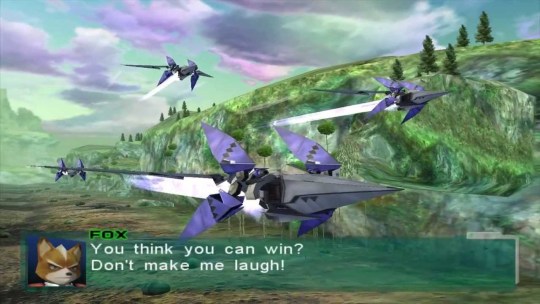
So, here’s what I would add, I suppose, if I were to somehow have the ability to rewrite Assault. Originally I had this in paragraph form, but I’ve made it into more of a list under topic segments with main points bolded for your viewing pleasure. Some of these points might be considered nitpicky and while I do understand that yes, this is a game about space animals, I do hold the developers in high enough regard to make a game with a continuity that makes sense.
The Story Changes
- Reduce Pigma’s storyline in Assault. This is the biggest one for me because a bulk of the plotline feels like a giant chase to just get at Pigma and it feels like it derails from the actual plot with the aparoids. We only go to Sargasso because of Pigma. We only go to Fichina and then back to Meteo again, because of Pigma. That’s 3 levels in a 10 level game devoted to just tracking down Pigma and chasing him. While it makes the build up to fighting Pigma kind of nice, I personally feel like the plot could be reduced to 2 levels. If Assault overall was a longer game, I could see them making it 3 levels. Overall, though, in its current state, I feel like the side plot overstays its welcome and the aparoids promptly get shoved to the side in favor of “Oh no, we gotta get to Pigma!” And I get the main motive here is to show how the aparoids affect people and because of the build up, it does a good job at showing how utterly terrifying the aparoids are. But it’s still too long given the length of Assault’s story. The only alternative to this is make Assault longer, which... honestly, it should be.
- Revise the scene with Tricky. I’m obviously not well-versed in dinosaur biology but I’m pretty sure dinos didn’t grow that fast from what studying I HAVE done. And why is he suddenly king now? Did his parents die? He seems not affected by this at all? Like it’s a funny scene with him, Fox, and Krystal, but it’s odd if you really look at it. Give us, as players, more context because I’m still not even sure what happened to make Tricky suddenly the leader and... big. As a note, you’re gonna hear me gripe a lot about the Sauria level in this post.
- The Star Wolf + Peppy sacrifice is a low effort way to raise tension/stakes and then cop out. Oldest trick in the book, imo, is to act like you’re going to kill off important characters only for them to be alive miraculously. And let’s face it, as an audience we all know they aren’t going to kill those characters because it’s Nintendo and those characters are too beloved. I would’ve forgiven them for only doing this with Peppy or Star Wolf, but when you tack them both together and throw in the fact they make it seem like you’re going to have to kill General Pepper too... yeah, it’s just a bit much of the same trope over and over again. I wanted to put a note in here about how I’m fine with the Great Fox being “sacrificed” but overall, it needed to return to the series because of it’s icon status, but I think that’s more of a gripe at Command instead of Assault.
- Keep Pigma alive. This will conflict with a point I have later on about the game consistently having characters cheat death for easy drama points but with Pigma, I would’ve kept him fully alive... but maybe with some physical damage from the aparoids. I understand he’s semi-alive in Command and tbh I don’t know where I stand on that. Why keep Pigma alive, you might ask? I feel like his character has a lot more potential than being “just the greedy guy”. Like he’s got good potential future villain material for future games and... if I’m honest? I just don’t see Nintendo wanting to keep Pigma dead so why even bother killing him off? They couldn’t even commit to him being dead in Command anyways so it seems very moot.
- Bring Bill and Katt back. Assault is acts a bit like a big reunion of all of our SF64 favorites but our two favorite side characters are suspiciously missing. Wouldn’t Bill be out on the front lines fighting against Andrew in the beginning? Or maybe back in Katina? And wouldn’t Katt inevitably show up in the midst of the invasion, maybe to pointedly check in on Falco?
- Bring Andrew back for the final fight. I think Andrew being defeated early into the game is fine overall but I think bringing him back in for a reunion final fight against the aparoids would serve to really solidify that it’s really everyone vs the invading aparoid force. It would show that not only is Star Wolf willing to put aside their differences but so is basically everyone in the Lylat System in the name of survival. Imagine the Venomians and Cornerians working together against an aparoid fleet, giving Star Fox and Star Wolf time to attack the queen? I just think it’d be neat and it’d open up the potential for some fun banter mid-mission. I do understand that quite a few people consider Andrew canonically dead after Assault but personally, I feel that his defeat left his fate questionable (I’m a staunch believer that unless there’s a body, they’re probably alive, especially for Nintendo games because, again, they never like to kill people off) so him returning in Command never really bothered me.
- In general, reconsider some of the character portrayals. Unfortunately, when a series has a different studio for each game, character portrayals will inevitably have inconsistencies. While I give Namco a lot of credit for putting in oodles and oodles of detail into the game (particularly the levels), I think they failed in their portrayal of Fox, at the least, and Wolf is a considerable offender as well. While it’s obvious that Fox in Adventures was effectively modeled off of Sabre even in terms of personality, Rareware was at least able to justify Fox’s newfound jaded attitude with the passing of many years and a distinct lack of steady income, resulting in the team being in disarray. Assault’s Fox is a stark contrast to his cynical interpretation with seemingly no explanation other than maybe “Oh, I have more money and a gf, maybe I should behave myself”. As if the sudden change in personality wasn’t random, Fox also just seems very blah, like a blank slate stereotypical shooter game protagonist dude with little to no emotion. Wolf is less obvious but gets slated into a mentor-like role midway through the game and ends up in a respectful rivalry with Fox... which there’s nothing inherently wrong with that except for it happening abruptly (and, I mean, Peppy is right there). But I take less issue with this and more of an issue with the fact that there’s an entire level establishing that Wolf now runs a crime den with effectively what seems to be an army and no one bats an eye at this. He doesn’t even call on them to help with the aparoids. Did they all die when the aparoids attacked Meteo? Are they safe somewhere else? Where do they go? How was Sargasso able to operate without the CDF being on their doorstep with warrants for arrests?
- Don’t kill all the dinosaurs. A bit of a dramatic statement but the ending screen that showed all the damage to Sauria really bothered me. While I understand that the dinosaurs had less of a chance against the aparoids than a more technology-focused society like Corneria, I was a bit disappointed that the decision was made to just state that a lot of tribes had been wiped out. I know this could easily be retconned in a future game and I feel like it should be. “But why, Amalia? Why are you disappointed by that?” 1) It’s a little too grimdark for my tastes. 2) The fact it all happened off-screen felt very hand-wavy. And 3) It brings into question the entire point of Adventures. Why did we bother to save this planet if it was going to be reduced to rubble and ash 1 year later? Where were the Krazoa in all of this? Why did they not make an appearance at all to try to stop the invasion with their alleged powers? It just raises too many weird questions and I feel like Namco didn’t think it through too much. Which I mean, sure. Family, kiddo game. I’m not asking for bigbrain plot and lore but I’m squinting at this bit because it does feel very contrary to the lore from the previous game.
- Make the aparoids more relevant. As nice as it is to have a random bad guy from another galaxy, I feel like there was more that could be done with the aparoids in terms of their origins. Tiny things, mind you, not huge revelations. Off the top of my head, they could have been tied into Krystal’s backstory to help alleviate some of the complaints that she was too random to be added to the series’ main cast. Alternatively, they could have been a product of Andross or even a weapon prototype from Corneria that fled the lab (I actually thought the game was leaning in that direction for a bit then just Nothing Happened). I get that the vagueness of their origins leaves room for people to speculate and speculation is nice but... when you leave too many things unknown, it starts to feel less like giving fans room to interpret and more like just doing random things for the sake of it. I think a lore tidbit here or there would work wonders for the aparoids instead of leaving them as just borg/zerg clones.
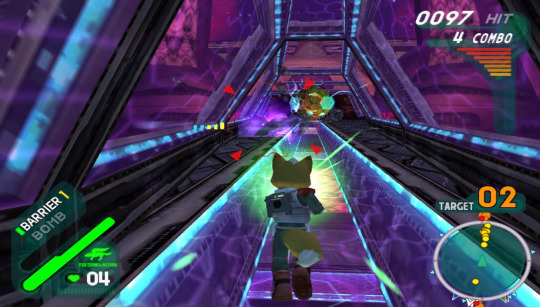
Level-Based Changes
- Add either Aparoid RedEye or Aparoid General Scales as a boss to Sauria. Given that this level mysteriously lacks a boss, which is just weird compared to the other levels, I think that they had the opportunity to add something cool to go along with the cinematic feel they were going for with Assault. Assault’s cutscenes do play in a movie-like fashion and it’s clear they’re trying to make the game as epic as possible. It’s a shame they had so much fodder for a great boss here but they failed to go through with it. Alternatively: Add a Krazoa-Aparoid fusion. Why? Because Star Fox is about cool epic sci-fi and that would be cool epic sci-fi incarnate.
- Add a boss to the Aparoid Homeworld Level, aka the penultimate level. Another one I felt was personally weird that there was no “final defense system” to challenge the team. Would be cool to do an aerial battle over the aparoid planet with some giant flying aparoid.
- Be kinder to Sauria. The level had some good homages but overall was incredibly small and incredibly short. It felt like a bone tossed to Adventures fans but was not entirely true to the setting built by Rareware. I’m... not even sure where the Sauria level is supposed to take place? I presume it’s Walled City but it doesn’t really have the same color scheme or aesthetic? Also where is my revised Adventures music? Why do all the other levels get it but Sauria doesn’t?
- Put some of those funky items from the multiplayer into the main campaign. I don’t know why some of these things, items especially, were omitted unless it was purely due to time constraints. I remember having missile launchers and jetpacks in the multiplayer and was a bit sad that they were not in the main campaign. Retuning the levels and adding those in would be a nice breath of fresh air for the more tedious on-foot missions.
- More levels. Self-explanatory. Still sad we didn’t get the Zoness or Titania levels in the single-player mode.
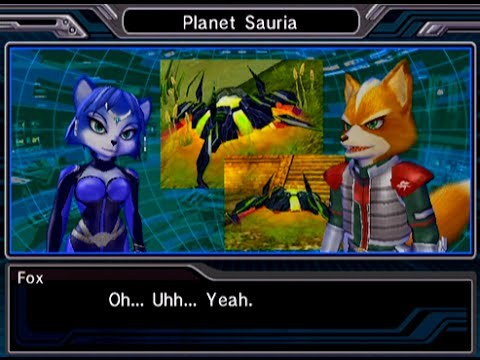
I think all of the above changes would improve the game, though I recognize all of this is being said 16 years later after lots of time to contemplate Assault’s weaker points. I’m not entirely certain how long Star Fox Assault took to develop but given that there’s obviously quite a bit scrapped from the game (an entire arcade mode was scrapped as well), I’m going to assume that the studio felt pressured to shove the game out the door and into the hands of customers. It’s a shame, really, because I think a little bit longer in the oven would have done a lot of good. Still, the product we got was good in its own right and a game that many people look back on fondly. I haven’t gotten to replay it in years but I hope to quite soon.
You might wonder why I bothered typing this all out and I guess my point was this-- Assault was great but it wasn’t perfect, and while a lot of other games fall under a crushing amount of scrutiny, Assault seems to dodge it. And don’t get me wrong-- I adore Assault. But given that not many takes exist out there about rewriting it, I decided to give it a shot. For variety’s sake.
I do want to a mock up of a revised Assault story, which I think I will get to work on after completing this while all my ideas are still fresh in mind. So stay tuned for that sometime in the near future. I will also be doing my Adventures mock up at some point but probably not for a little bit as I do wanna focus some of my free time on actual fic-writing.
Anyways, if you stuck around this long, thank you for reading! Have any changes you’d like to see to Assault if you could time machine your way back to the early 2000s? Feel free to post in the comments, I’d love to read your ideas!
32 notes
·
View notes
Text
Whether it was intentional or not, the way Mandalorian history and culture has been presented in Star Wars television is really fascinating.
You essentially have this really rich and storied history of a group of people that have a detailed culture that celebrates warrior prowess but also honor and family loyalty. It has good aspects, but it tends to lead to lots of people getting killed both on the sides of the Mandalorians and their enemies frequent dustups. It gets so bad that Concord Dawn, a Mandalorian colony, got blown to shreds and the surface of their homeworld is so battered by centuries of infighting that it is barren and cannot sustain life.
So you have this visionary young woman, Satine Kryze, who comes along and decides that she is going to change the entire thing from the bottom up. A new culture that values peace, education, and art over traditional Mandalorian values. This of course pisses a lot of people off, including her own sister, and leads to another war, but through some manner the pacifists win. Mandalore remakes itself.
This period in Mandalorian history is so wild and fascinating. It’s essentially a centuries long cultural norm being uprooted in the most drastic manner possible. It makes little choices like the presence of cubism, an art form that values reconstruction of images by forcing new and different perspectives, in Satine’s new Mandalore so creatively intriguing. In some ways it seems to be working. Sundari as shown in The Clone Wars, for a period of time, seems safe and has a thriving infrastructure. There’s education. There’s a healthy populace. There’s lots of cubes. So many cubes.
There’s just subtle things wrong. The economy is a wreck due to Satine’s pacifism and neutrality making it impossible to trade with the different warring parties in The Clone Wars and corruption is rampant. As much as Mandalore wants to change for the better, it may simply have just traded one bad system for another. It is also very clearly articulated, accidentally or not, that Satine’s Mandalore is overwhelmingly white. We see in Star Wars Rebels or The Mandalorian that Mandalore is a racially diverse people, but the New Mandalorians in Satine’s government are all mostly white. It’s a strange design choice that likely occurred behind the scenes as later media strove to diversify what was essentially a side story in The Clone Wars, but it is indicative of the fact that Satine’s government has intentionally tried to sweep away aspects of Mandalorian culture. The Protectors, various other clans, and eventually Death Watch all exist as extensions of Mandalorian rule that have fractured out from the galaxy and aim to separate themselves from Satine’s new government.
Death Watch is a complicated beast in and of itself. You have this organization that advocates for a return to Mandalorian traditionalism, but does so in explicitly violent ways. Domestic terrorism is their modus operandi and when we see them they have zero qualms murdering civilians, Mandalorian or not. Their respect of the tradition is expressed solely through violence and carnage. It’s a polar opposite reaction to Satine. It’s interesting that when we meet the Protectors in Rebels they clearly brand Death Watch as traitors. Although both subcultures honor the tradition, one went out of its way to reinstall it through violence and the other was content to offer its services when needed to those in need, as seen in the Kanan comic series.
Yet even then there’s complications in Death Watch. We have people that are flawed but seem ultimately honor and duty bound in their ranks like Bo-Katan Kryze, and as seen in The Mandalorian, Death Watch was also active during The Clone Wars protecting civilians from Separatist forces. It’s a messy organization that likely meant different things to different people, which is ultimately why it was so easily repurposed by different malevolent forces for destruction.
Regardless, there’s a reason why Death Watch so easily took over Mandalore in The Clone Wars and its people were so willing to accept this dangerous way of life back into the fold. You can only do so much to rewire centuries of cultural history in a few decades. However, through a mess of different factions and factors (Satine’s mostly well intentioned introduction of the Jedi into Mandalorian affairs, Death Watch and Maul’s coup, the rise of Palpatine’s Empire/Order 66), Mandalore is ultimately robbed of its freedom and put under the arm of the Galactic Empire. The warrior culture reemerges as a form of resistance to tyranny, but it results in more wartime, more subjugation, more opportunism by the people’s worst individuals, more of their cultural artifacts plundered, and even greater suffering.
We may not know what exactly transpired on Mandalore between Bo-Katan’s rallying cry in Star Wars Rebels and the scattered and battered covert we see in The Mandalorian, but it certainly wasn’t great. A culture that even in the worst throws of war against the Empire stood proud in their rebellion and insurrection has been reduced to underground nomads. Faces are no longer allowed to be shown to others, an apparently new cultural tradition that drastically changes the makeup of the clans, and most seek work as mercenaries or bounty hunters. New clans are formed with former family houses forced to co-mingle given their greatly reduced numbers. Moments of action or resistance are greeted swiftly with pushback and violent retribution. The chain reaction of Satine’s upending of Mandalorian history has cascaded to arguably their most desperate point in the people’s history.
That’s wild. Mandalorians have never officially appeared in any Star Wars film, but they arguably have a more defined and nuanced cultural history at this point than another other group in the franchise. Yes, even the Jedi. It has been fascinating to see them evolve over the course of the last decade, and honestly I can’t wait to see what other complicated futures Dave Filoni, Jon Favreau, and the rest of the team cook up. I would say that I hope things look up for them, but that’s probably not gonna happen.
#Me talking too much about Star Wars#Mandalore#Mandalorians#The Mandalorian#Star Wars#Star Wars: The Clone Wars#Clone Wars#Star Wars Rebels#The Clone Wars#Satine Kryze
4K notes
·
View notes
Text
SU rewatch- S1E11- Arcade Mania
Hey, long time no see!
I’m desperately bored in solitary quarantine at university right now, and decided to try and pick this SU rewatch series up again for fun. It’s been a while since I’ve watched through the show in order. Plus, now that this show is completely finished, there’s plenty more connections to make. I can’t promise I’ll be consistent with this, but at the very least I can have fun trying to make a few more posts at my leisure.
Anyways. With that business out of the way. Let’s get right on to the show!
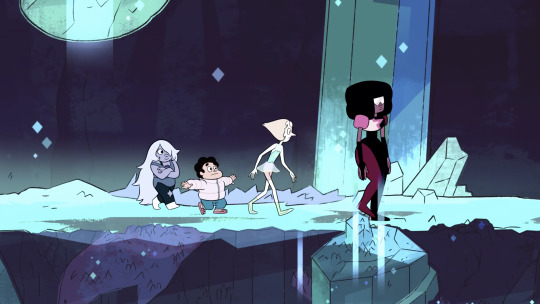
We begin with yet another mission Steven’s guardians have brought him along on! I believe this is the fifth mission we know of that he’s accompanied them on so far. (Lunar Sea Spire, Inverted Pyramid, the unknown mission he returns from in Tiger Millionaire, the desert, and now this one.) It’s really sweet seeing the Gems begin to trust him tagging along more often. There will come a day in the near future where missions become routine for Steven, but in these early episodes, you can really tell that each and every one is a brand new adventure.
In terms of plot, though, this episode is honestly Future Vision: The Prequel.
We learn a lot about Garnet’s abilities and her role in the team here, even if all of these details aren’t spelled out word-for-word quite yet. Hints towards her future vision we see this ep include:
Garnet moving ahead of the group to be in the perfect spot to catch Steven when he falls.
Her flawless moves while fighting and dodging the monsters.
Her becoming a master at the rhythm game later in the episode.
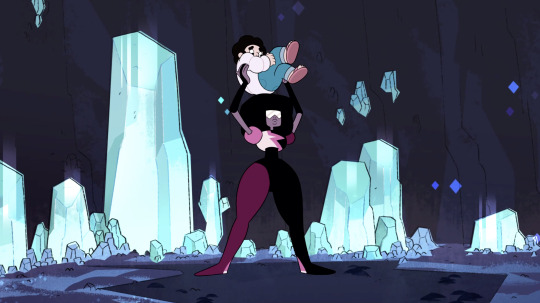
Like, damn. Look at this.
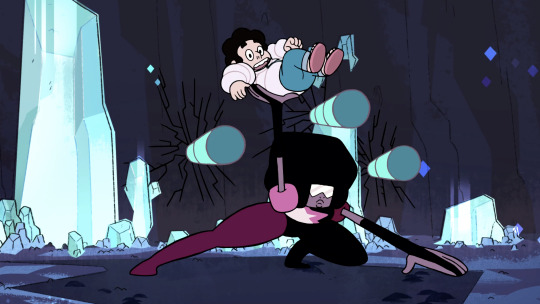
Look at her go.
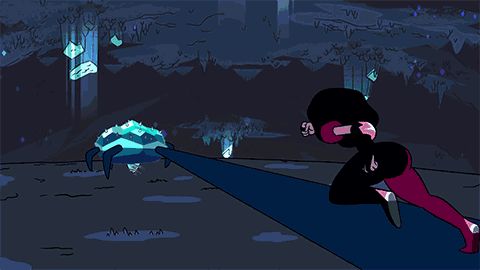
My Q U E E N!
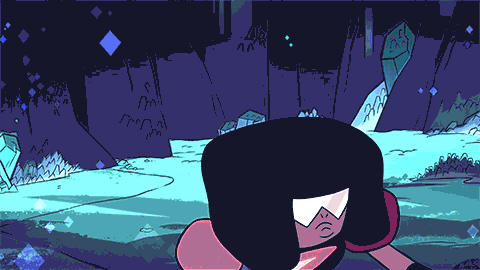
I had to gif all of this just because it’s such a beautiful and smooth sequence of animation.
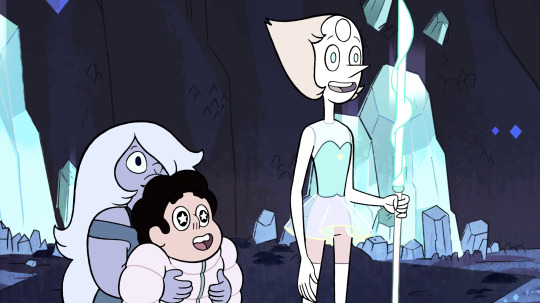
If there’s one thing all of the Crystal Gems can 100% agree on, it’s that Garnet is friggin’ amazing.
Garnet: “Let them go. They’re just parasites. If they want to be a problem, they’ll have to answer to me.”
So, does this statement mean that- at this present moment- her extended stay at the arcade was entirely beyond her future vision? That the only futures she saw were ones where she was actually present to deal with containment of the Gem parasites? Given that later scenes insinuate she’d never been to the arcade before, and would have no “data” about its games to factor into her internal understanding of the world, this seems likely.
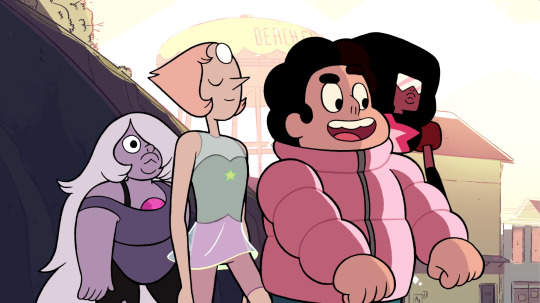
I adore the gradual palette change here, from shadow, to setting sun. It’s a nice detail that adds so much more life to what could otherwise be a rather mundane transition scene. It seems like unique palettes were more common in early SU- I wonder why Crewniverse stopped implementing these as often later on?
Pearl, entering the arcade: “Humans find such fascinating ways to waste their time.”
Thanks, Pearl. Love you too. <3
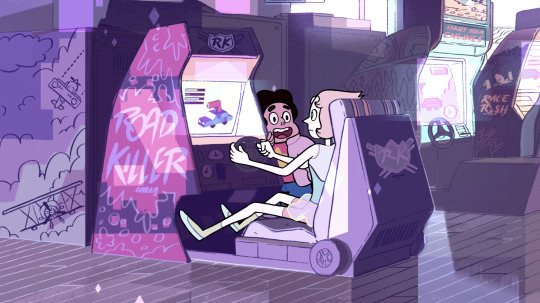
This sequence of Pearl failing at playing a car chase/road rage game hits so much different knowing what happens in Last One Out of Beach City. It’s genuinely radical how far she grows in confidence from this point, because here, she seems so shackled to rules and guidelines. Now that we know about her rebellious past, it might be tempting to write this characterization off as “early series weirdness,” but... I don’t think that’s what’s happening here.
Instead, I wonder if she’s working through grief-related regression.
Think about it... the pain of Rose’s passing is still so fresh for her. She was a rule breaking rebel once, yes, but she spent all of those days at Rose’s side. And I get the sense that she’s poured so much of herself into keeping Rose safe, into the rebellion against Homeworld, that without those, she’s caught in a vacuum. What IS her purpose now, when the very person she rebelled for is gone?
So she slips back into old pearl-like habits. Chronic rule following, and a fear of deviating from norms. How familiar. Thankfully, much of her arc throughout the show is her directly growing beyond these habits to live boldly as her own Gem.
The friggin video game when Garnet knocks its head off: “TELL MY WIFE I’M SORRYYY!!!”
Yo, what the fuck. This line is both hilarious and messed up, all at once. Please tell me the game isn’t sentient.
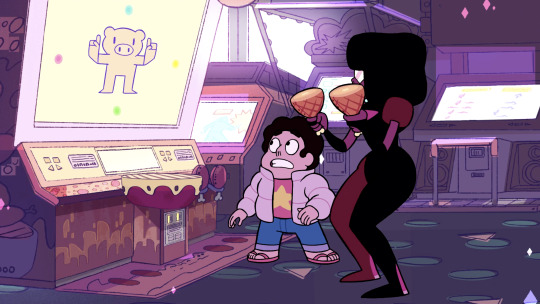
Aaaand here we finally introduce Garnet to the video game sensation that is Meat Beat Mania! This game is perfectly suited to her and her power of foresight because its patterns are algorithmic and not vulnerable to spontaneous deviations, and thus easy to predict, with enough input. She’s probably getting a quick rush of satisfaction with every correct move, and she barely has to exert any energy with her future vision to get that rush. After years and years of wading through endless possibility at every avenue, this video game’s patterns must be a rejuvenating breath of fresh air.
It’s addicting.
...Kinda makes me think of how I get sometimes when I play solitaire on my phone for an hour straight. After a while, I barely even think, I’m just shuffling through my deck and moving cards almost on automatic. I don’t have to use much energy to play, and it gives me animated fireworks every time I finish a match. It’s a win-win.
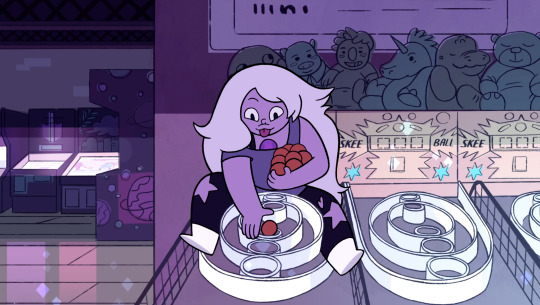
Amethyst: “I’MMA WIN AN AIRPLANE!”
I don’t know what it is about the way Michaela Dietz says the world “airplane,” but this makes me laugh every time. Does... does she think she can win a genuine airplane here because she saw Onion win a tiny motorbike from the ticket booth?? Amethyst, oh my god. XD
She’s got the spirit, this wild child.
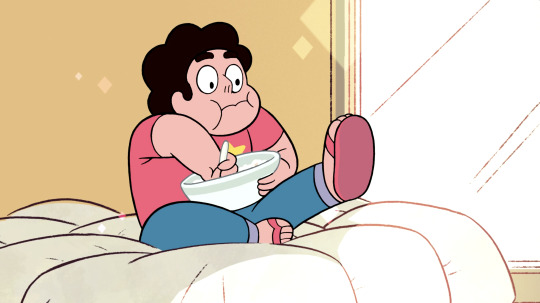
So, moving on- we meet up with our crew later the next morning, Garnet nowhere to be seen. There’s an interesting exchange I’d like to highlight real quick-
Pearl: “If we’re supposed to fight a giant foot, Garnet would let us know.” Amethyst: “Yeah, Garnet’s the boss!” Pearl: “Well, we’re all a team. Garnet just has heightened perception that guides us towards our mission objectives.”
Considering the specific phrasing Pearl uses here- “heightened perception” instead of “future vision-” did Garnet outright tell the two of them to not explain her powers, just like she told them not to mention she’s a fusion? Because I’m pretty sure no one ever uses the phrase “heightened perception” again in reference to her powers.
Given the fact that Garnet chose to keep the knowledge of Ruby and Sapphire under the table until she felt Steven could understand her better, my guess is that this is a similar scenario.
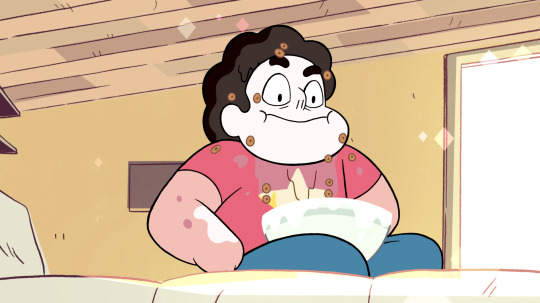
Ahah, I genuinely can’t tell if this is Steven being gullible, or just impulsively playing along with Amethyst’s antics. Still- gross, kid. Don’t wipe your wet cereal face on your shirt! Ew! :O
When he goes outside and starts to use a kiddy metal detector to scan for quarters... so THAT’S where he finds his arcade money! Because I can’t imagine Greg is financially able to give him that much to spend on non-essentials at this point in the show.
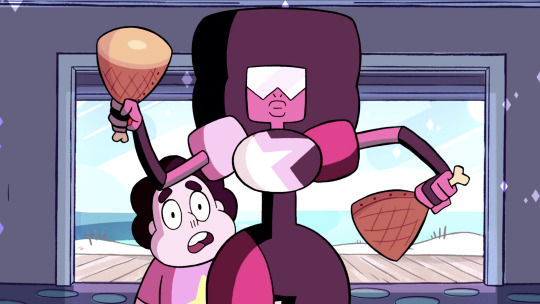
Okay, so... I just want to bring light to the fact that Garnet has literally been in this arcade ALL NIGHT LONG.
It was evening when she first arrived here- the sun was visibly setting in the background, and when Steven, Amethyst, and Pearl left, the sky was dark. But now it’s morning. Steven was just seen eating breakfast. And Garnet is STILL HERE.
Does this mean Mr. Smiley locked her IN? I have so many questions... Did he try to get her to leave, only to be intimidated by her complete lack of response? I would kill to know more about this interaction. Poor Mr. Smiley. That man deals with so much bullshit in this town, huh?
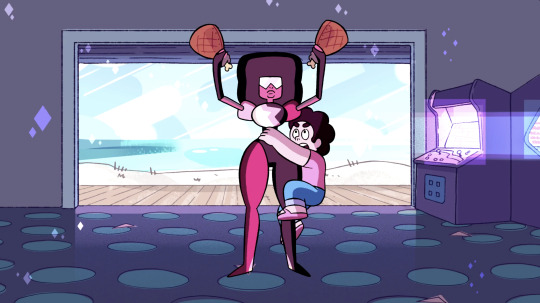
Geebus, is Garnet a solid wall. Previous episodes have shown Steven forcibly shoving whole tons of food, and swinging a mini-freezer over his head, and yet he can’t get her to budge even an inch.
I absolutely adore how he climbs up her frame like a koala, though, ahah. Cute.
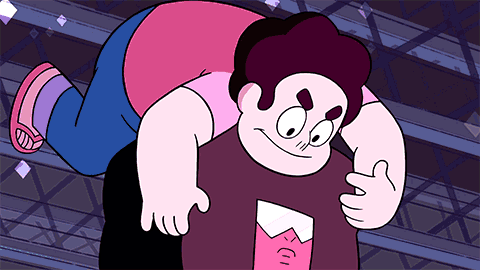
Meat Beat Mania announcer: “That’s rare!!” Steven: “Oh my gosh...!”
I take these two lines as evidence that this is the first time Steven’s ever seen Garnet’s eyes. Specifically, the fact that there’s three of them. Which, makes sense- since Garnet is still really reserved emotionally at this point, and is only begins to get in the habit of taking her visor off to show Steven her full face later on in the show.
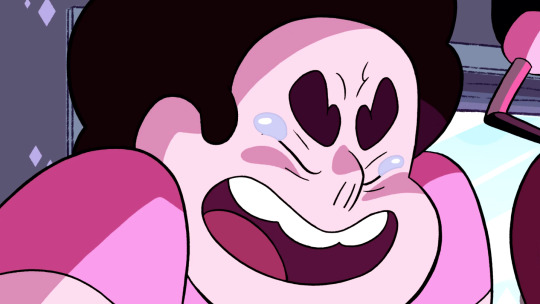
This expression deeply hurts me.
Steven’s so distraught here- because the others are in danger, the town is in danger, and he doesn’t have his trusty, dependable guardian who catches him when he falls and beats up scary monsters for him. Without her, the whole team is vulnerable and blind.
He feels alone. He feels... powerless.
And so he responds to that confusing, powerless feeling by trying to compensate with his own power. When all other routes he can think of fail, he smashes the video game console.
It... uh, it works... but once again, Steven entirely fails to consider the consequences, huh? He experienced a little bit of character growth in this regard in the episode Serious Steven, but even past that it’ll remain an recurring issue for him. Hell, his impulsiveness is a general character flaw even stretching into SUF.
In summary, though:
Poor Mr. Smiley. He works so hard, and doesn’t deserve this BS. ;-;
121 notes
·
View notes
Note
Ultimately in general, do you think Paul is into men? Or like do you think he tried something with guys?
(I just wanna take 2 seconds to say that ive been taking painkillers recently, and although they’re pretty mild, they still leave me a bit disoriented. So if im talking utter rubbish - that seems out of the ordinary to usual nonsense - that might be why)
In my ever so humble opinion, I don’t think Paul is bisexual/gay, and ill outline my main reasons for believing he is straight:
1. Paul has stated that he is straight, and has never claimed to be bisexual/gay
Paul has been known to lie in interviews, and with him being an 80 year old man, whose been married 3 times with children, and is one of the most iconic, beloved and respected figures of the 20th century, it is understandable why he might want to keep his bisexuality concealed (assuming that he is bi). Its a lot of pressure to put on one person - and if you include the addition of him having a relationship with John, thats even more pressure. If he were to reveal he had a relationship with John, he would be all alone in that declaration, because of course John is not here to stand with him. Plus, he’d be changing the entire narrative to the Beatles breakup; and id assume that if him and John did have a sexual/romantic relationship, there must be parts that were messy, and mean-spirited. We know how dark the breakup was, even without the involvement of sex/romance. Paul tends to resist talking about heavier subjects, so I think an interviewer would have a lot of trouble discussing sexuality with Paul. So of course its possible Paul could be lying, and he has a reason to; but I do think that his word is worth something, and the fact that he has never identified himself as being bi is still something worth accounting for. It doesn’t have to be end of every discussion concerning Pauls sexuality, after all, there were times John appeared to claim he wasn’t bi, but its still just a factor to consider.
2. The lack of rumours concerning Pauls sexuality
When it comes to John, we have the word of several people to account for his sexuality (eg. Yoko, Pete Townsend, David Bowie) - and even John’s own words validate this. Of course, John could’ve been kidding with every comment he made about his bisexuality, and I suppose it is something we’ll never know the real answer to; but I feel we have enough reason here to at least doubt and call into question Johns sexuality. But with Paul, there appears to be few people accounting for him being anything other then straight. Rumours are obviously not the most reliable sources in the world, but they’d at least be suggestive of something. I get the feeling that with John, his bisexuality might have been a sort of “open secret” amongst many (“John Lennon had reputedly spoken to mutual friends of his own experiments [with homosexuality]” - Pete Townsend). And perhaps Paul being bisexual is an “open secret”, but ive personally never heard anyone make that claim, so I just wouldn’t be able to say with any real certainty.
And in fairness, as a few different people have pointed out, it could just be that Paul has a great PR team - I mean, he very rarely seems to have an controversies, so it must be a pretty damn good PR team - but then again, it could also just be that there has never been a substantiated claim to Paul having had sexual/romantic relations with another man. Perhaps we’ll find out more once Paul (I hate to say) dies, but for now, we remain at a loss.
3. The evidence for Paul being bisexual overall just isn’t strong enough for me
There are things that might make me doubt my belief that Paul is heterosexual. I can see the argument for song lyrics supposedly being telling of the truer nature of their relationship (eg. Dear Boy, The Long And Winding Road, Oh Darling!, Coming Up, Call Me Back Again). Even the Lennon/McCartney breakup on a whole shows a profound emotional turmoil between the two, that is somewhat evocative of a breakup between lovers. And then of course, there are the looks and off-hand remarks that maybe tell us something about the two. But at the end of the day, none of these things are concrete enough to convince me that Paul is bisexual, or that him and John had a full-blown relationship; it just feels like speculation to me. And I think we run a danger to some extent in pointing to things like “song lyrics” as certain evidence that Paul is attracted to men (specifically, John), because the way people express and articulate themselves is complicated and messy, and somewhat difficult to comprehend. Especially with lyrics as an art form, they are not always as straight forward as we may perceive them to be. The “evidence” that I would consider the most reliable, are probably things either Paul or John have said in interviews, or anecdotes involving the two (especially from the breakup). But as I said before, its just not concrete enough for me.
As for your second question, id hazard a guess to say he tried something, at least once, with a guy. I couldn’t prove this, but I just feel like most people will experiment at least once with someone of the same sex, and with Paul being an already-progressive guy who has knowingly surrounded himself with and supported gay people for decades, I feel like at some point or another maybe he just tested the waters y’know. Like he’s probably at least kissed a guy, just to find out. But like I said, I cant prove that claim, but its just a guess from me.
If anyone has any “evidence” - I always feel a bit silly for some reason saying “evidence” when discussing someones sexuality - concerning Pauls sexuality that I didn’t discuss here, or disagrees with anything ive said, feel free to challenge me on this! I am intrigued to hear why you guys believe Paul is bi!
20 notes
·
View notes
Text
“Dependable senior” Kido Jou
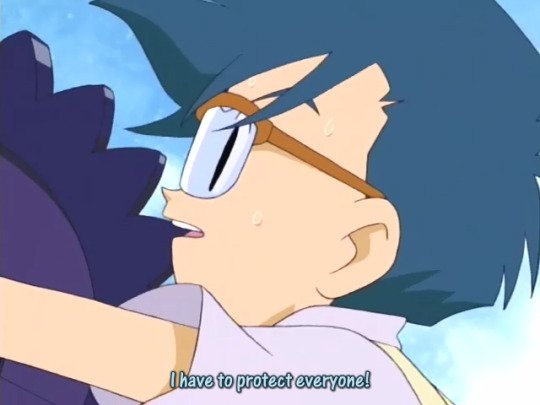
Continuing my thread of analyzing the Adventure characters in detail, today we’ll be talking about Jou, Adventure’s most famous disaster character whom most of us have probably started feeling may actually be the most relatable character in this cast. It’s hard not to love him, honestly, given how earnestly he works so hard at everything and yet has an unfortunate tendency to dig himself into a hole.
Let’s just cut to the chase and talk about Jou!
Jou’s family background
Adventure is of course known for its overall focus on family backgrounds, but Jou’s is fairly different from the others’ for a lot of different reasons. We never meet Jou’s parents in the series itself, only in a drama CD, but we do meet his brother, Kido Shin -- and in fact, Jou’s the only Adventure kid to have siblings outside of the group (two, in fact, although we don’t meet Shuu until 02).
Jou’s family is what’s often called an “elite” family -- one that pushes for its kids and family members to have a certain degree of “high status” through their career. Even those in non-Asian countries will probably recognize that academic achievement measurement pressure is endemic to the culture in general -- especially since Japan has standard entrance exams go all the way down to high school level -- but it is especially prominent in the case of the Kido family, and Jou’s father has been pushing all three of his sons to become doctors, largely because he wants one of them to inherit his clinic. (While it’s not as extreme as Sora’s problem with iemoto position inheritance, Jou’s position of being in inheritance pressure is not entirely dissimilar.) It also means that just being any kind of doctor isn’t enough for him -- it’s got to be one of the “dignified and prominent” kinds of doctors (heavily implied to involve surgery, given the mention of blood).
In addition, while it’s not strictly said within the series itself, it’s implied that Jou is feeling a lot of pressure in terms of being the youngest of three sons, when the older two have a huge age gap with him. Jou is only in elementary school, while his second oldest brother is in high school and his oldest brother already a medical student! (By the time Adventure is over, both brothers are in national university, which is a really tough achievement.) Within his family, Jou really is The Baby compared to two high-achieving brothers who are already “well on their way to great things”.
In order to be on the path of becoming a doctor, Jou starts off the series, only in elementary school, in the “prep school track” -- or, what’s basically a constant cycle of getting into a good school so that he can get into another good school so that he can get into another good school (et cetera). Again, Japanese schools have entrance exams as early as high school, so this is something he’ll be setting on very early. I also cannot emphasize enough that for anyone who has to go through this process, it is absolute hell. I have never met anyone who actually enjoys doing this; it’s a means to an end. It’s very hard to have your heart into this unless you want the final goal that badly -- vague promises of status alone don’t do it -- and even those who do want it often end up demotivated and going through the motions with their will broken partway into it.
And, unfortunately for Jou, he’d already had a good reason to not want to do this from day one.

Jou has severe blood phobia. (Formally called “hemophobia”, although I tend to avoid that term given that it’s one letter off from something else.) Shin even makes it clear in this scene from Adventure episode 38 that any doubts about Jou’s ability to become a doctor don’t have anything to do with his personality or abilities, but the fact is that this is, indeed, a very serious and concrete problem for someone who intends to become a doctor (or at least, again, the kind of doctor that his father wants him to be). It’s possible that Jou outright fainting at the sight of blood might be a bit of an exaggeration, but it’s definitely enough of a deterrent that he’s not feeling this whole thing at all, and convincing him to actually care about becoming a doctor is going to require a huge uphill battle. By default, the answer was already a huge, capital NO in giant letters before anything ever began. And yet, Jou continued to force himself to go through the motions.
It should also be made clear that while Jou’s father was pressuring him to become a doctor, he was also not trying to force Jou to become one. The drama CD where he appears had him actually outwardly encourage Jou to do whatever he wanted instead of forcing himself -- but it was also extremely clear that he was still personally very unhappy and dissatisfied with the idea of all three brothers not taking over his clinic. As much as the Kido brothers do seem to be concerned about their father’s disapproval, it’s less so out of fear of retribution and more that they just really worry about disappointing him. Hence, this is why Jou continues to follow the path even when he’s not really feeling it, and it’s important to understanding Jou as a character for the rest of this post: Jou has no personal interest in status or honor, but is motivated by his sense of duty towards other people.
Even so, “because my father really wants me to” isn’t exactly very motivating in itself, and, all in all, Jou starts off Adventure very jaded about his future prospects, and rather demotivated and uninterested in them. But come the events of Adventure, Jou, the aforementioned “baby of the family”, gets recasted as the oldest in the group -- which becomes a huge factor in how he ends up changing his view of himself and his personal goals.
Jou in Adventure
Jou starts off the series assigned as Mimi’s camp group leader, but even Mimi senses an aura from him that he doesn’t seem very “reliable”. In this case, the word “reliable” doesn’t refer to his Crest name (which did get a dub name of “Reliability”) but rather various words that effectively mean “able to be counted on”. Which, at this early point of the story, Jou is decidedly not. Once the adventure gets off the ground, Jou easily succumbs to stress, and especially the stress and burden placed on him from being the oldest in the group.
If you’re wondering if that one-year difference between Jou and Taichi/Yamato/Sora really is that big of a deal, culturally speaking: yes, it is (especially when everyone’s at this young age), and Jou isn’t just being stickler about it. You can actually see an example of how this comes into play once they return to regular society in Adventure episode 29, when the kids are allowed to go to Hikarigaoka purely because “a sixth-grader” (Jou) is with them. This is the kind of responsibility that society normally imposes on him, and this is what he carries even into another world.
In fact, Jou’s aware even from the get-go that he’s not exactly cut out for that kind of role. From the Adventure novels:
Jou thought about it. He, too, felt sorry for the younger boy… but it would be over for his leadership if he went back on what he’d already decided. Give them an opening and they’ll soon be walking all over him. He just couldn’t have that. Jou was all too aware of his own often indecisive personality. ... When they heard what had transpired between her and Jou, Yamato and the others glared coldly in Jou’s direction. What was this, a dictatorship?
As a result, he initially rubs everyone the wrong way because, in their view, he’s trying to impose his will on everyone like some control freak, but as it turns out, being a control freak is actually part of Jou’s stress response.
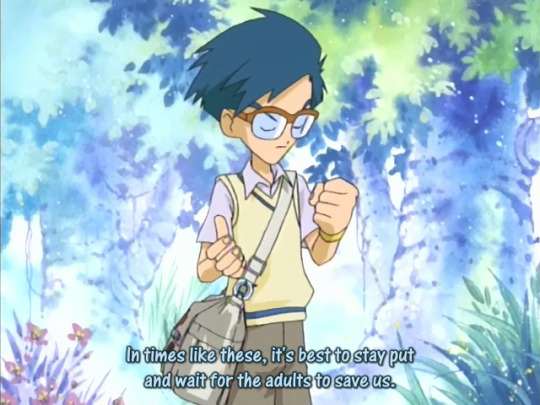
Said control freakishness manifests in Jou constantly spending the early part of the series by leaning back on “the rules of society” -- including the early series running gag of him insisting that there must be “adults” there, when this is clearly not the case to everyone else present -- because, for someone like him who easily gives into stress and anxiety and has a nasty tendency to become incredibly irrational, leaning on those “rules” is some degree of comfort to him. Now that he’s been dragged into another world, he’s desperately clawing at anything that can bring his sense of “reality” back -- hence why he keeps relying on the concept of “adults”, because the truth is that he himself isn’t actually that capable of handling the situation on his own, and he’s trying to convince himself that there’s Some More Reliable Thing Out There that they can fall back on.

The infamous “egg scene” in Adventure episode 7 is certainly comedic when Jou overreacts to everyone harmlessly listing off things they like on their eggs, but things quickly take a turn for the dramatic when Jou practically has a mental breakdown over it. In the end, Jou so easily succumbs to anxiety that even little things like “being a little out of order” stress him out to no end. The world is easy to understand and explain when everything is in the right place, and chaos has a tendency to completely disorient him.
But on the other hand, it’s also in Adventure episode 7 where we learn that Jou’s control freak behavior isn’t because he actually cares about any kind of status or honor for being the oldest, but because he truly, truly feels responsible for everyone’s welfare.
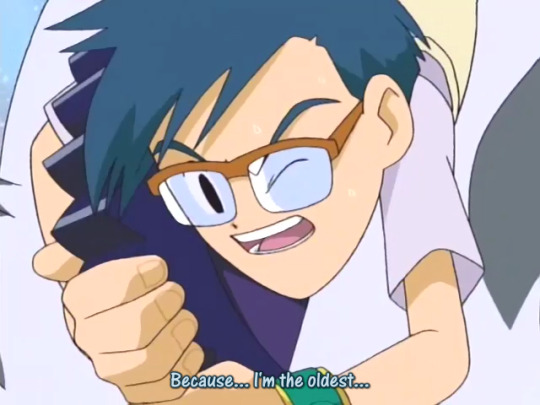
“Because I’m the oldest” is a statement that Jou means in the context of him having a duty to protect everyone -- beyond everything, the one thing that does make Jou passionate is how much he truly, truly cares about other people’s welfare, to the point he impulsively throws himself onto the Black Gear-controlled Unimon and tries to yank the gear out with his bare hands. In fact, said episode demonstrates that Jou can be recklessly self-sacrificial when he wants to be, because his failed attempts at dispute resolution lead him to conclude that he should be the one to take one for the team. For all it’s worth, Jou has the right idea when it comes to trying to take leadership, because he’s very much doing this for the welfare of others more than he ever cares about himself or the glory of the position -- it’s just that, being rather reckless, rather paranoid, and not very good at actually thinking straight, his way of going about it doesn’t tend to always land right.
But it’s undeniable that he cares, and he’s trying, and this leads to a shift in how the rest of the team comes to perceive him for the rest of the series now that they understand that his intentions really are for their sake, not because he’s trying to be a jerk about it.

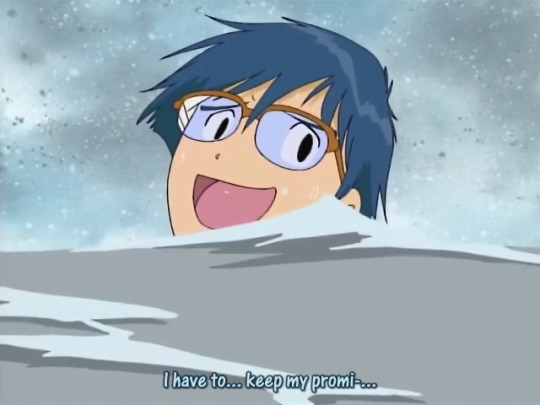
And that comes out to be the one most prominent trait about Jou for the rest of the series, especially in Adventure episodes 23 and 36 -- as much as an unpredictable loose cannon as he can be, he’s so loyal to his friends and determined to protect them that he would even recklessly throw himself into the line of fire for them. That’s the basis of his Crest, which is something that’s been translated half a dozen different ways, but all boil down to the same principle: he has a strong sense of duty and responsibility to other people, and will always make do on his promises to others or his desire to provide for them.

After a few of their initial bad starts, the Adventure kids never treat him badly -- in fact, both Sora and Mimi respectfully call him “Jou-senpai” as if to acknowledge his position over them in school, something that’s stuck very well with the actual fanbase (more on this later). Of course, everyone tends to get exasperated at him or worry about whether he’ll actually pull through on anything he attempts, but the majority of the humor revolving around Jou in Adventure has very little to do with anyone insulting or tormenting him, and more that he tends to be so dramatic and high-strung that he kind of digs himself into a hole. (Like how he tries to angrily chastise everyone for spending their money on food in Adventure episode 30, only for the revelation that he’s starving himself to kick in and for him to sink into the exact opposite extreme.) Ultimately, everyone comes to understand that Jou’s working really hard for their sake, so they cut him a bit of slack.

In fact, while Taichi initially complains about Jou sitting out of their trip to Shibaura to find the eighth child for the sake of entrance exam studies in Adventure episode 32, the kids strike a compromise by dumping all of their phone call work on him. Of course, this is a bit of “revenge” for him not accompanying them, but it is effectively the other kids respecting his right to sit out and not have to completely give up on his real life obligations even in the middle of the eighth child search, by allowing him to participate in the search in a way that’s more convenient for him.

But despite diligently sticking to the motions, Jou doesn’t actually emotionally care about all of this. We even get a hint of this in Adventure episode 35 -- Jou gets what he calls “the worst grade in his life,” presumably due to all of the stress he’d been going through lately, having just gotten back from the Digital World and all. He also bounces back incredibly quickly, saying that he’ll have to call and inform his parents he’ll be back late.
In the end, Jou doesn’t really care about his grades or performance when it comes to cram school, even despite insisting on sticking to it, because he’s just not feeling it. He doesn’t even want to be a doctor all that much; he has no true motivation and no reason to care. (The only time Jou is ever portrayed as actually liking doing any kind of studying at all rather than doing it as obligation is when everyone’s listing off what they miss doing in Adventure episode 6, but it’s in a context where everyone’s talking about missing home, so it’s more of him missing his daily routine and what’s “familiar” to him than anything else.) He went through the motions, and was slightly disappointed about the grade, but the “ultimate goal” of becoming a doctor had no personal meaning to him, and so he shrugs it all off.
Jumping in physical danger to save someone’s life? That’s a no-brainer -- Jou would easily throw himself into the line of fire to do so, because he’s so passionate about protecting other people and taking responsibility for them that he’ll gladly sacrifice himself for anyone else in a heartbeat. But this whole thing about becoming a doctor and his future career is such a vague thing that he doesn’t even want that it’s arguably more of his “required daily routine” than it’s actually something he cares about all that much.
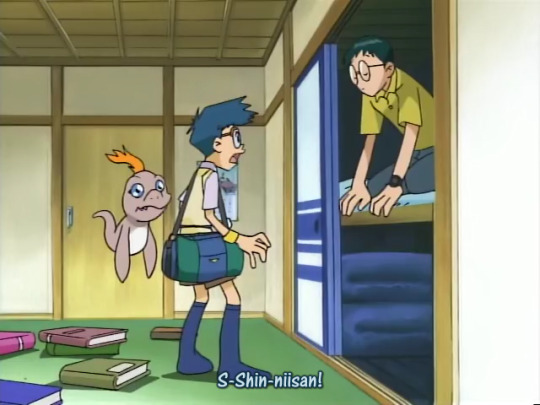
And so, we finally meet Kido Shin, in Adventure episode 38 -- he’s the oldest of the Kido brothers, already a medical student, and, ostensibly, the one closest to their father’s goal of having doctor sons. Yet his first appearance indicates that even he doesn’t have it all together, either -- he sleeps in the closet (Jou didn’t even know about this!), and somehow just slept through all of his surroundings being kidnapped. So even one of Jou’s apparent models is a bit of a disaster himself -- and, more importantly, Shin leaves some advice with Jou that sticks with him for the rest of the series.
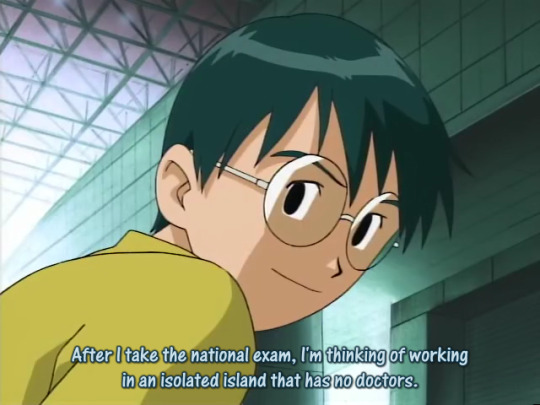
Shin does not intend to be a doctor in the way their father wants him to be (remember, he specifically wants them to take over his clinic). This is Jou’s first time hearing about this, which is important because it means it’s the first time Jou is having such a major shakeup to his likely perception of Shin as a “prior example” -- and Shin knows this, because he promptly uses himself as an example of why Jou should also be free to choose his own path. Jou being the Kido family’s “baby” especially comes out in the novel, because Shin implies that he thinks Shuu would feel independent enough to not need any advice about this, whereas Jou definitely needs it.

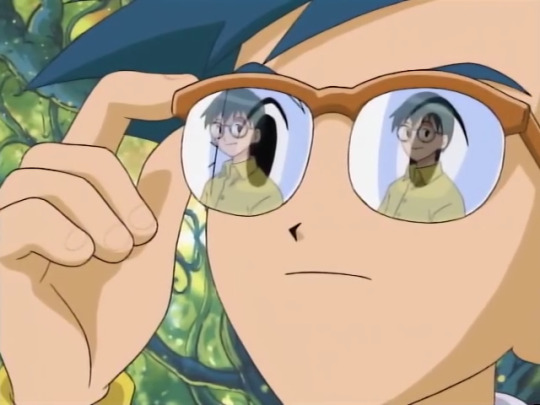
We don’t get follow-up on this until after they return to the Digital World, and Mimi witnessing a handful of deaths and eventually Taichi and Yamato falling out brings her to her emotional limit; Jou decides to take responsibility for her, and while part of it is presumably because he’s had charge of her as her camp group leader since the beginning, it’s also clear that the recent events in the Digital World are weighing on him in their own way, as are Shin’s words about finding his own path.
What he wanted to tell her was this: that he didn’t see any likelihood of co-existing with the Dark Masters, and that they had no other choice but to fight them. Even a neutral country like Switzerland had a military. They would be invaded by enemy countries without one. It would be nice and ideal if they used the nonviolent resistance approach as Ghandi did. But that didn’t mean it was okay to just be killed without lifting a finger… But not even he could find a good answer.
QUESTION: Under what circumstances is it okay to battle?
That sort of question would never appear on a school test, and he’d never once thought about it before…
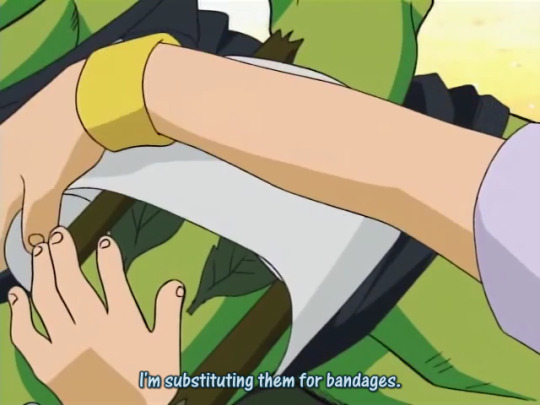
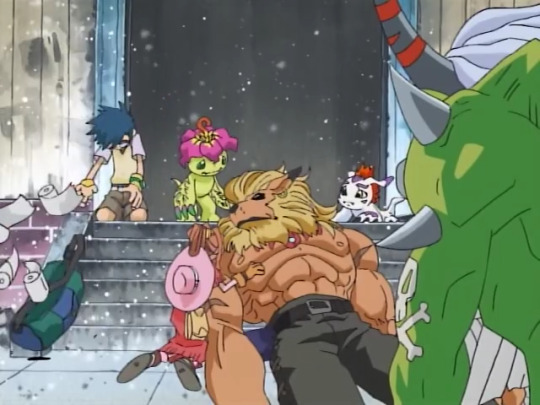
But on their way, Jou and Mimi encounter Ogremon and Leomon, and for the first time, Jou’s peripheral knowledge of medicine from his father starts having a practical use -- up until then, “becoming a doctor” had only been something that he’d been following for a vague sense of status that he didn’t even want, but here, Jou starts to see the connection between that goal and what it would mean for what he wants: to be able to help people right in front of him. Shortly after, when Leomon’s death turns out to involve injuries beyond that a sixth-grader can take care of with his limited supplies (”toilet paper won’t fix this!”), Jou is suddenly hit with a certain sense of reality: if Jou wants to truly help others, there is much more of a skillset he’s going to need to gather in order to do so.
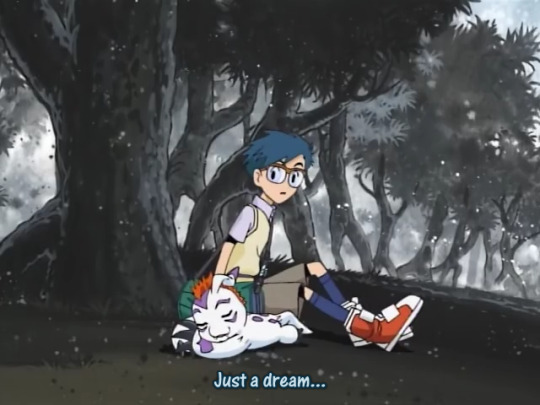
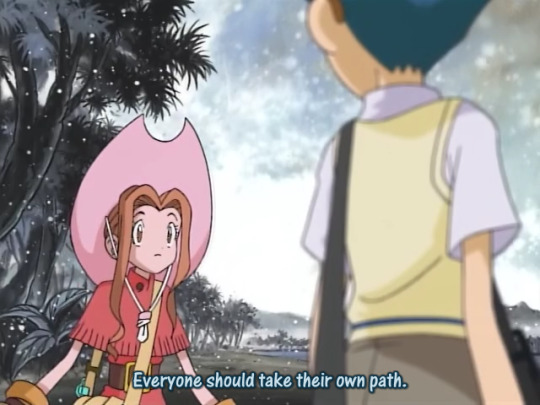
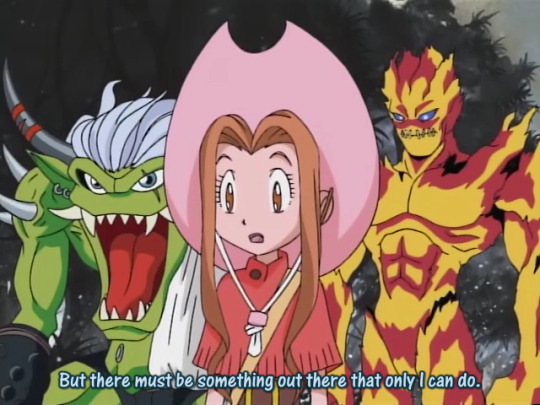
So by the time of Adventure episode 50, Shin’s words now weigh so much on Jou that he’s even dreaming about them, and he finally internalizes those words of “everyone taking their own path”. In short, this is Jou acknowledging that fighting isn’t the only way to meaningfully contribute -- after all, Mimi has a severe aversion to fighting or seeing more casualties and thus can better meaningfully contribute by gathering allies to work together, while Taichi and Koushirou are directly in the front lines.
Jou, ostensibly, decides to go off and find Yamato, but there’s another layer under this: Jou admits that he’s not very strong, so much to the point that he doesn’t think Gomamon will reach Ultimate, and feels like there should be “something only he can do”. The full answer to what Jou started touching on here, and what he ends up doing thereafter, is stated in explicit words in Two-and-a-Half Year Break:
When we were in the Digital World last summer, many of the Digimon got injured and died. I couldn’t do anything for them, even though I was a doctor’s son. I don’t want to ever feel useless again! Not when someone is hurt in front of me. The Digital World doesn’t have a doctor. They need someone who’ll be able to heal them. Even now, I carry around a simple first-aid kit just in case the Gate opens again. Because of it, my bag is always crammed. And my arms are becoming muscular. [laughs] Really! By the way, I have a problem. Of course, I’ll be doing regular doctor studies, but I’ll be treating Digimon, you know? Don’t you think I’ll need to study veterinary medicine too in order to heal them?
And thus, Jou finds the all-important link that actually motivates him to want to become a doctor -- the one thing that had always been a constant about Kido Jou was that he could not leave people behind when they needed help right in front of him. Or in other words, he has a marvelous case of Good Samaritan syndrome (a whole eleven years before Kudou Taiki, at that!). “Feeling useless” is pretty much on the very, very top of the list of things he hates the most. And, by his own admission, “fighting” is not really his specialty, and he doesn’t even particularly like it himself.
But he wants to meaningfully contribute in some way, and now, here’s an option that isn’t fighting: he has the roots in a talent for treating the wounded and preventing casualties that way. All he has to do is hone it. And just like how Shin decided that he specifically wanted to be a doctor in a place where a doctor would be needed most, Jou also decides he specifically wants to be a doctor for the Digital World, because that is something he can meaningfully provide for instead of becoming a doctor for the status.
He’s still going to disappoint his father this way, but never mind that: he’s found something that he wants, and it’s his own path, like Shin told him to follow. And yes, that means even if he has to fight his own blood phobia to do so.
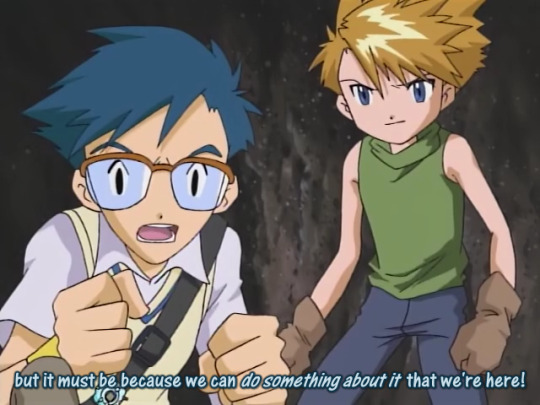
And this becomes very important to how he’s able to confidently help bring Sora out of her darkness-induced spiel in Adventure episode 51, where she -- who has a problem with a compulsive tendency to burn herself out in helping others -- starts falling into despair because she caves to the pressure of having to save everyone. Yamato and Jou, together, simply re-shift her frame of mindset: it’s not that being a Chosen Child is about trying and failing to fulfill a particular duty, it’s that there’s a situation happening and they are actively making the choice to do everything they can. Because, really, Jou himself understands it best -- he’s never been someone good at doing things because other people tell him to, he’s someone who’s gotten this far because of his own personal sense of responsibility and priorities being so strong, and that’s why he’s capable of pushing on with his own path and what he wants.
02 and beyond

Jou was, unfortunately, forced to sit out the events of Our War Game!, but as far as blaming him for it goes, it’s really hard to; he had no idea this was going on at all, and by the time the incident had hit climax, he was already in the test room and impossible to be contacted. (You can imagine he was probably quite upset about not having been able to help out afterwards.) As for why nobody tries to pull him out the way they do end up pulling him aside a few times in 02, it’s because this isn’t just a practice exam for prep school -- this is THE exam. Remember, this kind of lifestyle involves a chain of needing to get into a good school to get into a good school to get into a good school, and Jou is aiming for a national university like his brothers; this actually could impact the rest of his career, and given that the other kids respect how important this is to him, it’s also understandable that they’d be a bit hesitant to pull him aside from this.
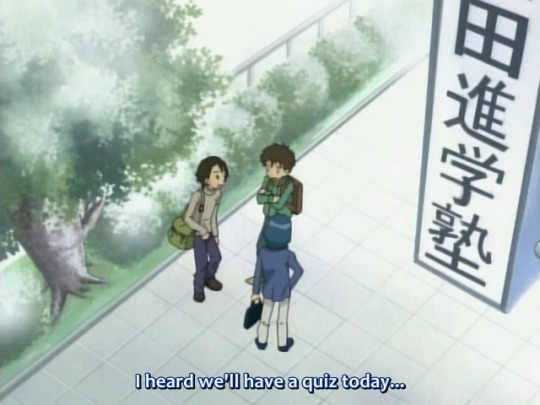
We’re first properly reintroduced to Jou in 02 episode 5. Unlike Taichi, Yamato, Sora, and Koushirou, Jou does not attend Odaiba Middle School, which means that, assuming that the Adventure universe Odaiba is like the real-life one in which Odaiba (Koyo) Elementary and Middle are the only schools on the island, Jou regularly spends his school and prep school days off the island and quite separated from the others. Instead, Jou attends a private middle school (hence why he had to take an exam to get in), presumably one that’s intended to help him on the medical school track.
But despite that, his first major scene in the series is to ditch prep school to go help Gomamon. For someone who doesn’t know Jou very well, this probably would seem appalling -- that someone so studious would be so willing to ditch at the drop of a hat -- but anyone who does know him well would probably not be surprised; after all, “being a doctor” is still a far-off dream, whereas Gomamon needs help now, and the number one thing Jou can’t stand is to leave people in need behind.

Unlike with Taichi, Yamato, Sora, and Koushirou, who all have some degree of connection to the 02 juniors in some way (Taichi and Yamato being Hikari and Takeru’s brothers, Taichi and Sora having known Daisuke from the soccer club, and Koushirou having known Miyako from the soccer club), Jou is a complete stranger when he’s introduced to Daisuke, Miyako, and Iori, with Digimon-related work being the only connection they have to him at all. Despite that, the new 02 kids, being well-behaved juniors who really look up to their elders, immediately endear themselves well to him -- in fact (you can thank @takerusfedora for this observation), Miyako squishing Poromon in delight upon seeing him, and the context she usually does this in, hints that she might even see him as attractive. (Considering that he’s a prospective medical student from an elite family, this probably shouldn’t be too surprising.)
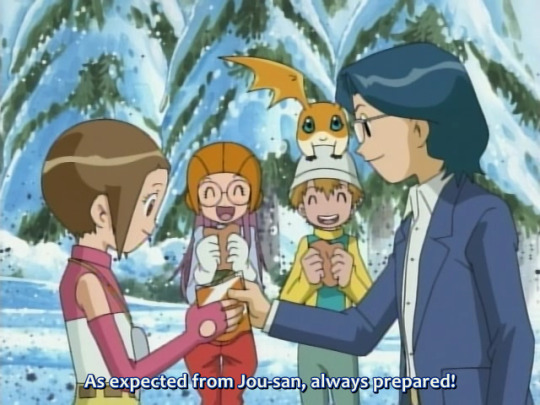
While the fact he’s medical school bound isn’t explicitly brought up in the series itself, the fact he’s well on that path is already pretty evident by his actions, given that he comes stocked with heating pads and other medical supplies, just in case. Takeru comments on him always being prepared -- because he’s constantly thinking of other people and how he can be useful to them.
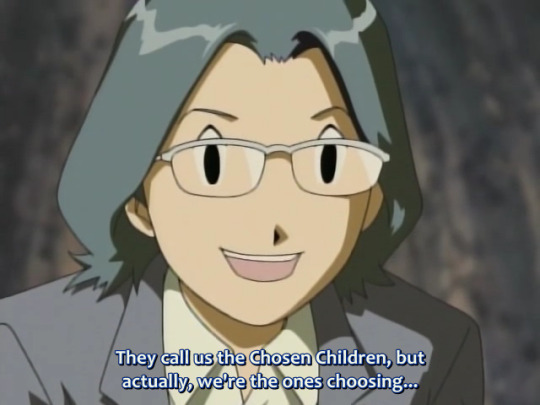
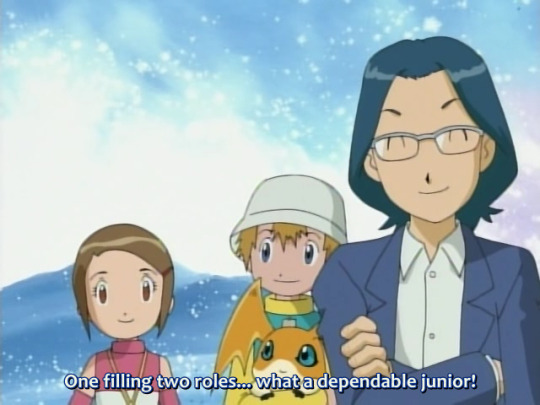
This episode also marks the beginning of a particular relationship between Jou and Iori, which is quite an interesting one considering that we’re talking about the oldest and the youngest of the group of eleven (not quite twelve yet) Tokyo Chosen Children at this point. As many point out even within this episode, Jou and Iori have a lot in common, and it’s likely Jou sees a bit of himself in Iori -- someone who has a firm insistence on principles (even beyond the point of practicality), but also is protective of others and hates to see them hurt. Not only that, Iori had even gotten a similar lesson from his grandfather earlier in the episode about the importance of “making one’s own decisions” -- and so, the two share common ground in Iori having ditched his “duty” to practice kendo with his grandfather that day in order to help Gomamon, and Jou having done likewise via ditching his prep school classes. Because Iori will always have more kendo lessons, and this certainly won’t be the last prep school class Jou has, but these are effectively two kindred spirits who care so much about friends in need that prioritizing them over all else is non-negotiable.
Jou compliments Iori by calling him “dependable”, which is a huge compliment coming from someone who, at this point of the story, regularly attracts comments like “dependable senior”. 02-era Jou gets this kind of reference a lot in press materials and fan descriptions of him, because now that he’s matured a bit and isn’t as prone to making ridiculous, reckless decisions or being as emotionally high-strung, his on-point aspects like being very on-task and always keeping his word are much more visible.
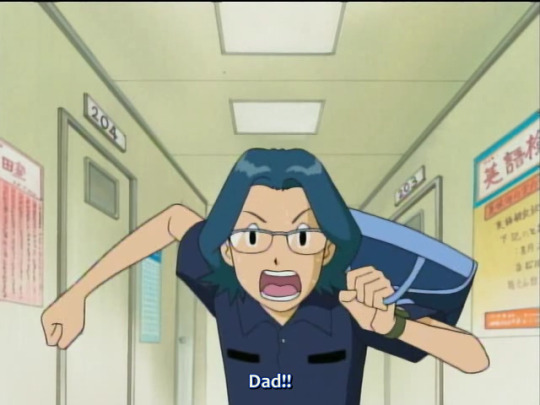
Well, that said, he still kind of starts screaming loudly as soon as he hears his dad is supposedly in trouble in the middle of his exam in 02 episode 16, so he’s still a little emotionally high-strung. But never mind that!

As usual (especially since this is most likely a practice exam, one of many Jou will be taking for the next year), Jou doesn’t mind being interrupted all that much; it’s not like exams are any fun anyway, so of course Jou doesn’t really care about being pulled from it, especially when Daisuke and the others are literally suffocating to death at that exact moment.

Unfortunately, for Iori, this entire incident is a convergence of things totally eating away at his psyche; he’s still blaming himself for everyone being trapped down there, he’s just placed a burden on Jou, and his grandfather had just said that lying is the worst thing that one could ever do, so now Iori thinks of himself a horrible, undeserving person. But Jou is someone who empathizes with being so stuck on “principles” that you forget the big picture, and reframes it in a way Iori can understand: lies are bad when they hurt people, but in this case, not lying would have led to much, much worse happening, and both Iori and Jou share that common ground of absolutely hating the feeling of standing by and doing nothing while others are in trouble.

We also finally meet the third (or, technically, second) Kido brother in 02 episode 33, Kido Shuu -- and while we don’t see him interact directly with Jou (at least, not until the drama CD), what we learn about him contextualizes Jou’s situation even further: Shuu not only decided to leave the path of inheriting his father’s clinic, he’d also decided to ditch the medical school path entirely, switching to humanities because he was so fascinated by Professor Takenouchi’s work. That’s a pretty drastic shift, but, as Shin had said in the novel, Shuu is the type to be independent enough to do whatever he wants without Shin even having to advise him of this, and given that he made this decision less than a year after the events of Adventure, it was likely a huge motivator in Jou deciding that their prior “example” of being medical students wasn’t necessarily something he needed to follow when both of his own brothers weren’t even following that standard anymore to begin with.
And, much like with Jou, Shuu’s new chosen profession also brings him closer to the Digimon, except in an “understanding more about them” sense rather than Jou’s medical sense. So, just like Shin wanted, all three brothers found their own paths.
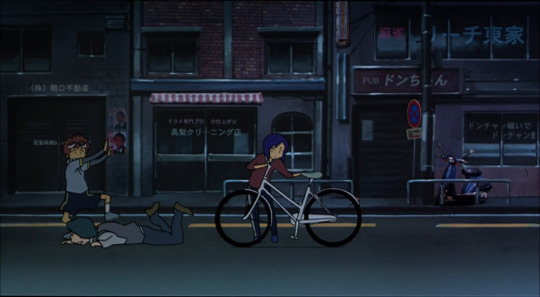

In Diablomon Strikes Back, Jou is thankfully blessed with being much more available to deal with the conflict; he starts off stuck in a long line to register for high school in the midst of scrambled records, but comes to assist Daisuke and Ken with a bike as soon as he’s able. This movie being quite the comedic one, you get to see a bit of his disaster tendencies slip back in as he scrambles to help everyone -- but, as always, he’s doing his best.
A lot of people have also pointed out that the movie spends an awful amount of scenes depicting him in the company of the girl he borrowed the bike from, which has led to a few amusing extrapolations, but at the base level implies that he at the very least wanted to make absolute sure that her bike was safely returned to her once everything is over -- after all, Jou would hate to be responsible for someone losing a bike, or in debt to someone. He’s someone who fulfills his obligations, after all.
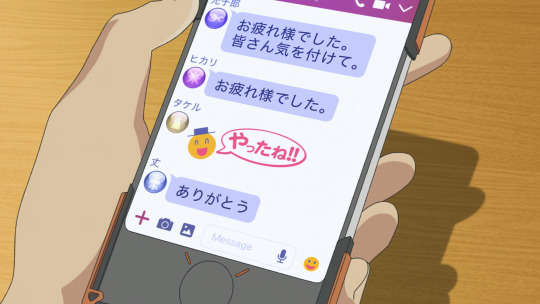
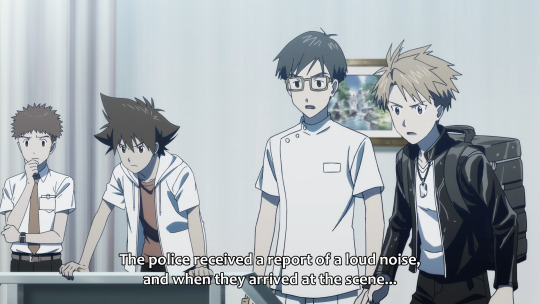
By the time Jou actually is in medical school in Kizuna, he truly has become among the crowd too busy to participate regularly in Digimon incident tackling (similar to Sora and Mimi), but To Sora indicates that he’s still keeping tabs on everyone through their group chat and emotionally supporting them, and it’s made clear in both the short and the overall movie that the rest of the group is sympathetic to and understanding of how difficult life is to juggle with all of this. Not only that, much like how Jou stated back in Adventure that he was looking for a way to meaningfully contribute and help out besides just fighting, Jou plays an important role in using his position to tend to all of the Eosmon kidnapping victims.
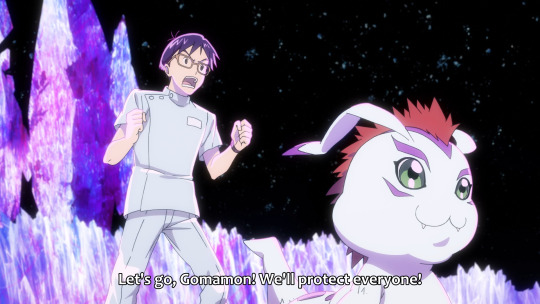
At least, until he ends up becoming a victim himself and is actually dragged into the fight -- and, now that he’s actually on the spot and the conflict is right in front of him, he approaches it with enthusiastic gusto, indicating that he’s still able to be as emotionally high-strung as ever.
We get more info on Jou in his Memorial Story short, “Kido Jou: Medical Student” (which takes place at some unspecified point before the movie), where we learn that Gomamon is still worried about how much that blood phobia thing might impact Jou’s career, and “tests” him by having himself and Agumon pose as mock victims. Jou, very tired and not in a mood to play, snaps at him (rather understandably, given that Gomamon is kind of being a bit insensitive here), but when Gomamon is injured, Jou immediately puts everything aside to help him, even through -- yep -- blood.
Again, it’s not entirely clear how severe Jou’s blood phobia was back when he was a kid, but it’s at least put on the table that Jou’s figured out a way to push past that in order to fulfill his dream, and especially when it involves a loved one being hurt in front of him. Jou tires himself out pretty badly with the work, but hey -- he used to jump recklessly into physical line of fire for his friends, so of course that kind of thing is nothing to him. (But he still apparently is a bit lacking in the confidence department.)
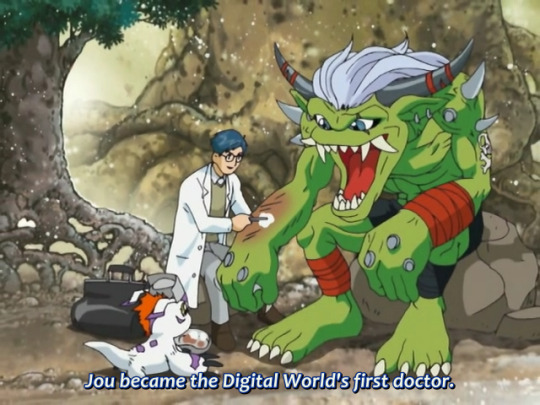
Because Jou was lucky enough to be able to concretely decide on what he wanted to do as early as elementary school, Jou’s epilogue career is naturally the single most straightforward, and really just amounts to “you know that thing he wanted to do? He did it.” And indeed, he becomes the Digital World’s first doctor -- presumably not inheriting his father’s clinic, nor following a high-status expected path, but choosing to become a pioneer in a place he has a deep emotional stake in, in a place where he’s needed because there are no alternatives. And, of course, he’s depicted treating Ogremon, who was effectively Jou’s first “patient” all the way in Adventure, the first step in him realizing that this was his path, and his alone.
Meta
Jou occupies an interesting position in the Digimon fanbase in terms of memes, considering that there’s a fanbase meme of over a decade where anything relevant to him gets people spamming “JOOOOOOOOOOOOO” (with varying levels of Os). Being a comedic but lovable character who tries his hardest but repeatedly runs himself into a corner, he also happens to resonate much harder with the adults in the audience rewatching the series, because all of us as disaster adults can just so easily look at him and go “oh, that’s me.” He also seems to be inexorably tied to the word “senpai”, given that so many characters call him that (including the 02 kids, who never went to school with him); after a certain point it’s hard to dispute that he (especially in 02) exudes this kind of “dependable senior” aura, and, like with “Ken-chan”, the Japanese fanbase has a tendency to constantly use “Jou-senpai” all of the time to refer to him affectionately.
His Japanese voice actor, Kikuchi Masami, also holds the distinction of having been in nearly every Digimon TV series to date (the only exception, as of this writing, being Appmon), with him having been Jou (and Jou’s entire family of two brothers, his mother, and his father) in Adventure and 02, Dolphin and Grani in Tamers, Neemon in Frontier and Adventure:, Kurata in Savers, and Damemon in Xros Wars. (Him being the absolutely despicable Kurata in contrast to the endearing and lovable Jou has been cited as quite a shock to many.) There’s been many a joke about Kikuchi’s constant presence, but Jou is undeniably his most iconic role for the franchise, and you can also imagine it’s conversely gotten a lot of people to fondly think of him every time Kikuchi reappears.
#digimon#digimon adventure#digimon adventure 02#digimon adventure last evolution kizuna#kido jou#jou kido#kizuna spoilers#shihameta#cw blood mention
105 notes
·
View notes